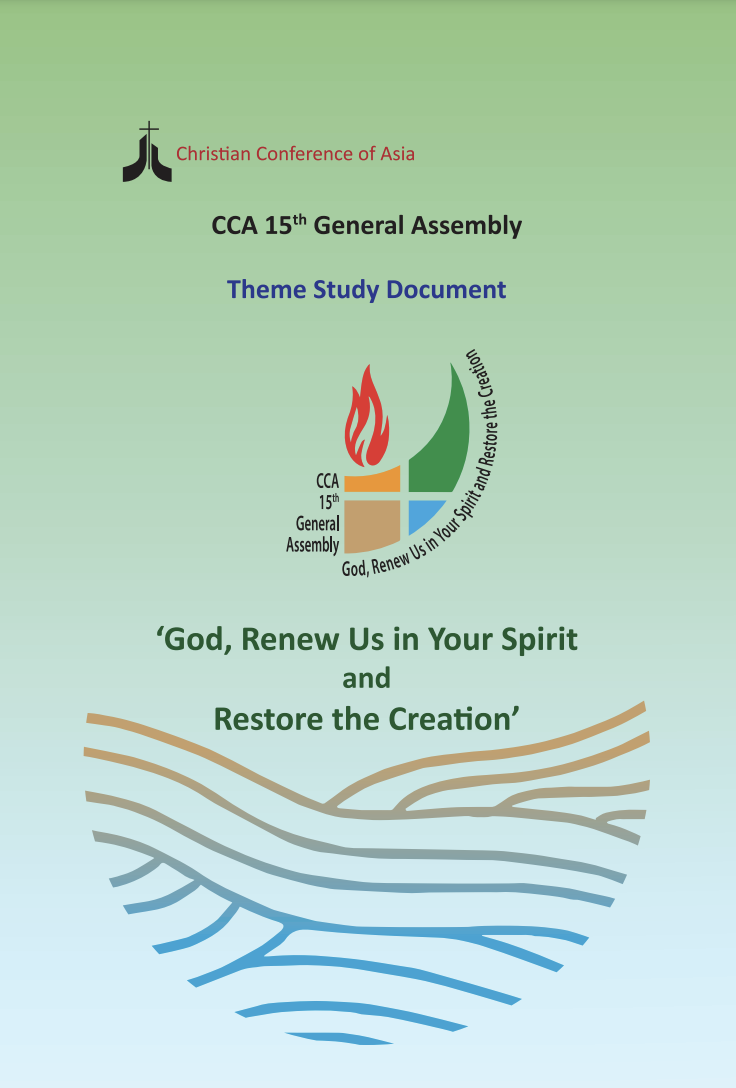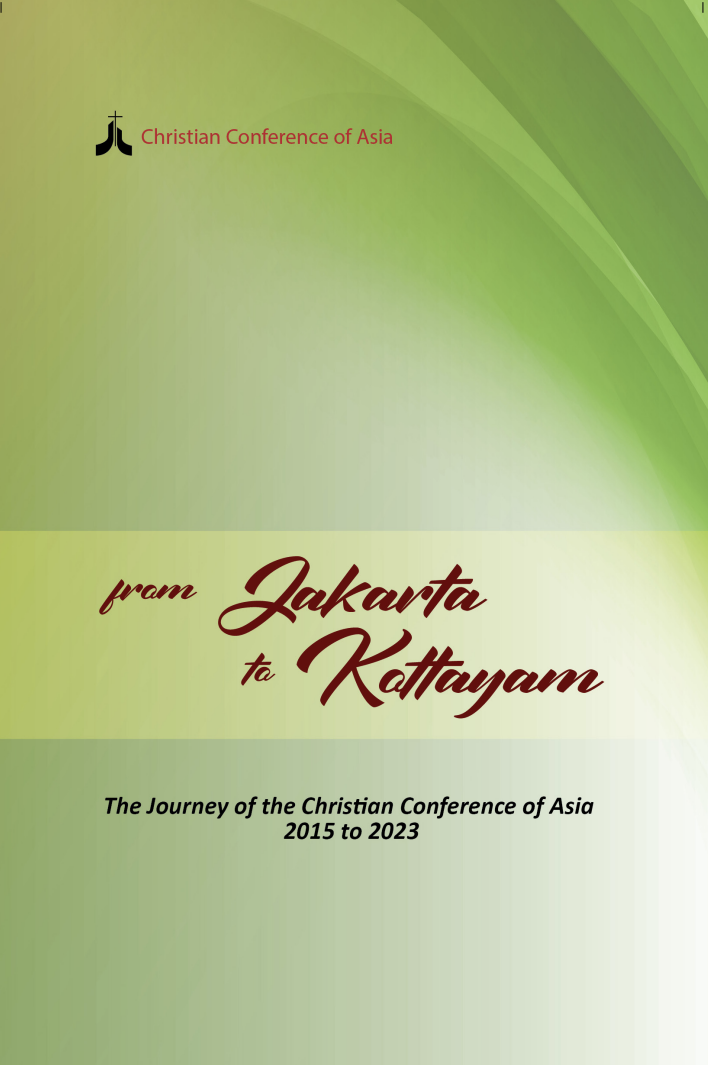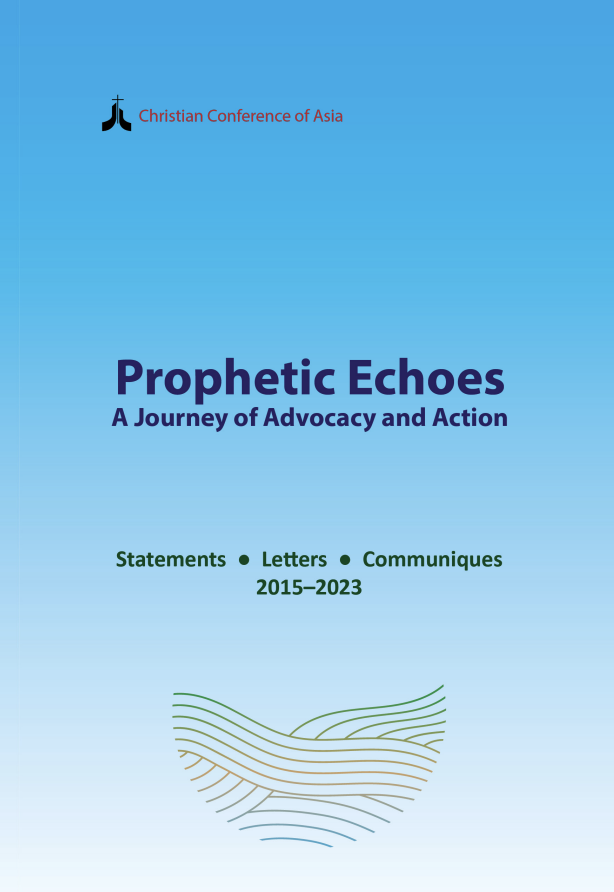CCA Assembly
-
The 15th General Assembly of the Christian Conference of Asia
-
Theme and Logo
-
Schedule
-
Churcha – Interactive Sessions
-
Resources
-
Pre-Assembly Events
-
Stewards Programme
-
Past CCA Assemblies
The 15th General Assembly of the Christian Conference of Asia
The 15th General Assembly of the Christian Conference of Asia
The General Assembly is the highest governing body of the Christian Conference of Asia and normally meets every five years. It is a special event when representatives of the CCA’s member churches and councils as well as ecumenical partner organisations come together for a celebration of faith and to reaffirm the unity of the fellowship in the Asian ecumenical movement.
- As the supreme decision-making representative gathering of its member churches and councils, the General Assembly celebrates the unity of the churches in Asia in worship, study, and action.
- It provides the opportunity for the representatives of the CCA members to express the common vision of the churches for the direction and mission of the CCA.
- The General Assembly reviews the programmes and assesses the work carried out by the CCA through its programmes for the past years. It is also an occasion to enunciate general directions and a common vision for the future mission and programmes of the CCA.
- The General Assembly elects the leadership of the CCA for the upcoming years. This includes the Moderator, Vice Moderator, Treasurer, and 17 members of the Executive Committee.
The CCA 15th General Assembly will take place in Kottayam, a historic multi-religious city in the southern state of Kerala, India. The last assembly in India took place in Bangalore in 1981.
The city of Kottayam is an important centre of the St Thomas Christians in India, a community that traces their origins to St Thomas the Apostle, who is believed to have visited Kerala in 52 CE and established churches. Kottayam was also a centre of Church Mission Society which initiated pioneering missionary activities from 1816, such as the promotion of education among oppressed peoples leading to a social renaissance in the region.
Theme and Logo
Theme and Logo
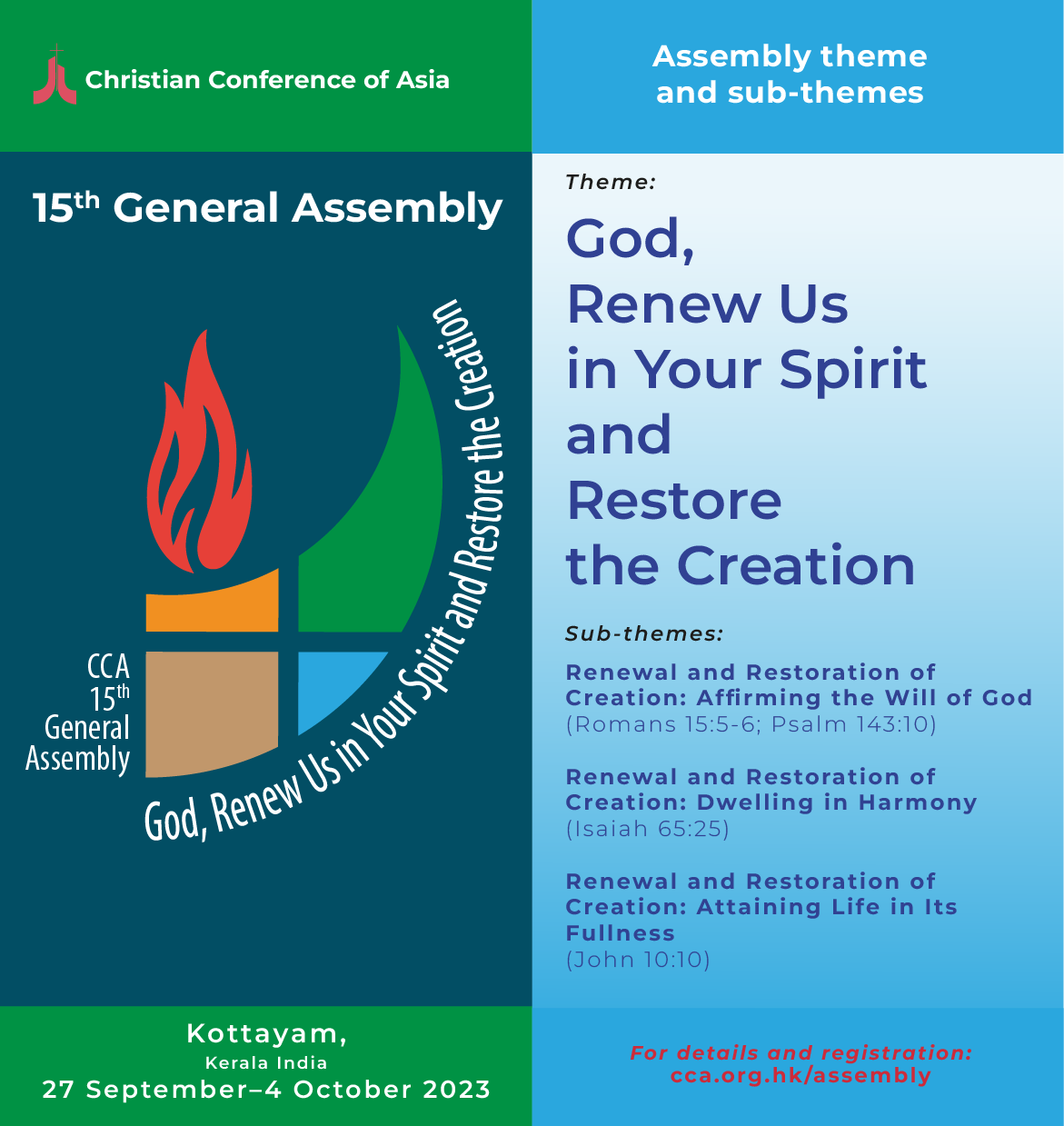
Schedule
Schedule

Churcha – Interactive Sessions
Churcha – Interactive Sessions
A key feature of the General Assembly is the deliberative and discursive ‘Churcha’ sessions. ‘Churcha’, which means ‘conversation’, ‘discussion’, or ‘sharing’ in different Indian languages, is a space for ecumenical dialogue on emerging and pressing theological, social, and geopolitical concerns, which will also help shape the future work of the CCA’s programmes and projects.
All Assembly delegates and participants will have the opportunity to choose from fifteen different topics as per their expertise and interests and join the Churcha sessions on the third day of the General Assembly. The Churcha sessions will be facilitated by expert resource persons and speakers, who will provide leadership in facilitating the conversations and help develop focused outcomes that will enrich setting priorities for ecumenical action in the coming years.
The Churcha sessions will be held on 30 September 2023. This will allow for the same group of participants to go in-depth in the exploration of the issue and create seamless collaborations, generating targeted and concrete recommendations for action by the CCA and the wider ecumenical community in Asia. The setting of the Churcha sessions will be at three different academic institutions in Kottayam town: two theological seminaries (Mar Thoma and Orthodox) and CMS College.
(1) Responsible Stewardship and Participation in God's Mission of Renewal and Restoration of Creation
In emerging Asian contexts, especially in the post-pandemic world, the mission of the Church is to participate in the renewal and restoration of creation, which is central to God’s plan for the world. The Church must concentrate on the manifestation of the Kingdom of God in its fullness here and now. The lack of stewardship in the care and sustainability of creation presents significant challenges to the church’s prophetic witness.
The Bible calls for the responsible stewardship of creation, which God has declared is fundamentally “good” (Genesis 1:31). The pursuit of sustainability, renewal, and the restoration of creation calls for a prophetic witness to the world, advocating for ethical stewardship of God’s creation. The ecological crisis threatens the existence of life on earth, and the church’s prophetic witness to the world must become more critical than ever. Churches must engage with scientific experts, with policymakers, and civil society, to develop sustainable solutions by way of acting out missions that can mitigate the ecological crisis. It is never too late to be prophetic.
The Churcha session on ‘Responsible Stewardship and Participation in God’s Mission of Renewal and Restoration of Creation’ will prompt Asian churches to lead the way in contextual theological responses focused on the sustainability, renewal, and restoration of creation. Asian churches must act quickly and responsibly, advocating for ethical stewardship of God’s creation. The Church, as an embodiment of prophetic witness, must orient its mission to be at the forefront to urgently address the complex and multifaceted problem in coordinated action from all sectors of society.
(2) Eco-Spirituality and Liturgical Innovations: An Asian Theological Appraisal
The Church and the mission of God are not two separate entities, but instead, the missio Creatoris Dei establishes the missiones ecclesiae, indicating that the church exists solely to participate in the Creator's mission. This mission is based on Christology, where Jesus is regarded as the ‘Ecological Ancestor’. Each creature within the web of life signifies God’s presence, embraced, and invited into God’s redemptive future. Through Jesus Christ, the Trinity uniquely entered in developing creation as the Incarnate One; the Word became Flesh, existing as a biological being, sharing the same existence with other creatures on this planet. Every living creature and ecosystem represents God, a reflection of divine goodness and beauty, a spark of divine life, and a revelation of God's goodness.
The congruity of liturgy and ecology is essential for a deeper understanding. Liturgy is an act of attributing worthiness, firstly to God, but also to historical events such as the deeds of the pioneers of our faith, together with the land, animals and birds, bread and wine, and the entire creation that God deemed “very good”. Worship extends to all aspects of creation, seen and unseen, celebrating the magnificence of God.
The Churcha session will discuss some questions for the Asian churches: Is creation celebrated in our worship services? Do our liturgical traditions include resources that renew our appreciation of creation's beauty and wonder while also calling out the ways humans harm it? How does our liturgy help us spiritually and morally to live in ways that honour the earth? Have we lost the art of awe?
(3) Climate Crisis Mitigation and Adaptation: Environmental Sustainability in God’s Oikos
Climate change has increased the frequency of natural disasters and calamities in Asia over the last two decades. Typhoons, cyclones, floods, landslides, forest fires, droughts, and other natural disasters have devastated the lives of millions of people in Asia. Despite early warnings about the potential dangers of typhoons, earthquakes, and landslides, many people are forced to live in areas that are prone to frequent threats of natural calamities.
Mitigation and adaptation must be emphasised in people’s responses to climate change. While there is ongoing advocacy to mitigate the effects of vulnerable situations, it is also feasible to find ways for communities to gain insight into actions that will be taken to ensure their safety and sustainability in the years to come. To mitigate the effects of climate change in communities, it is critical to investigate the state of the location while considering the hazards identified in recent studies. Once the community and its leaders have identified hazard-prone areas, these measures can be implemented. There is also a call to adaptation and resilience while considering the frequent natural disasters that strike a region. Considering the hazards would also imply selecting the best materials for homes, buildings, and infrastructure built in typhoon- and earthquake-prone areas.
The churches and their local congregations can be effective voices in advocating for environmental sustainability, taking both mitigation and adaptation into account. There are steps that churches can take in helping people better understand the issue, based on Christian theological and ethical principles and also on partnerships with governments, multilateral organisations, as well as other development agencies and organisations.
This Churcha session on ‘Climate Crisis Mitigation and Adaptation: Environmental Sustainability in God’s Oikos’ will discuss the best practices and models for mitigation and adaptation for environmental sustainability.
(4) Eco-anxiety: Churches in Asia Engaging to Address Health and Healing
“Eco-anxiety” refers to a variety of difficult emotions and mental states that are significantly related to environmental problems, while “climate anxiety” refers to the climate change-related forms of eco-anxiety. It is pertinent to consider how churches will be able to contribute to addressing this emerging concern and find solutions for fostering healing for those who are grappling with eco-anxiety. This involves posing critical questions regarding the role of the church in offering pastoral care to individuals experiencing challenges of emotions in relation to environmental and climate issues.
The church’s role in initiating community engagements for public health becomes even more crucial in the post-pandemic situation, given the context of pressing health challenges faced by many vulnerable communities in Asia. There has been an increasing trend of commercialisation in church-related medical institutions. Amidst the evolving circumstances of the climate crisis, post-pandemic circumstances, and conflicts in various forms in Asia, it is imperative for churches to acknowledge the shifting of paradigms in health, healing, and overall well-being. As a crucial catalyst for social transformation and the protection of human dignity, the churches have the duty to shape a world where everyone has access to quality healthcare.
The Churcha session on ‘Eco-anxiety: Churches in Asia Engaging to Address Health and Healing’ will examine how church communities can provide space for the wellness of minds and bodies of people through community initiatives. This includes maximising the potential of healthcare institutions of churches and providing pastoral care and support for emotional and mental well-being—thus promoting authentic and holistic health and healing.
(5) Dwelling in Harmony with Creation: Indigenous People in Asia
With rapid industrialisation and urbanisation in Asia, the way of life of the indigenous people and the natural resources they rely on are increasingly threatened. The indigenous people in Asia trying to maintain their way of life and protect the environment has gained attention in recent years, as their land and resources have been increasingly encroached upon by development projects and resource extraction activities. Indigenous people have been at the forefront of the fight against environmental degradation and climate change, advocating for sustainable development and the protection of their rights and territories.
Indigenous people have a deep connection to the land, and their traditional knowledge and practices have enabled them to live sustainably for generations. They view nature as a living entity and believe that they have a sacred responsibility to protect and preserve it.
The Churcha session on ‘Dwelling in Harmony with Creation: Indigenous People’s Struggles in Asia’ will emphasise the importance of recognising their efforts in maintaining their traditional way of life and their crucial role in protecting the environment. Furthermore, the discussion will also highlight the importance of recognising the knowledge, wisdom, and practices of indigenous peoples in addressing ecological issues. Their traditional knowledge and practices can offer valuable insights into sustainable living and environmental management.
(6) Welcoming the Stranger: Displacement, Statelessness, and Trafficking in Persons
The world is at its greatest level of displacement ever, millions of people have been forced to flee from their countries and escape from any disasters and conflicts. It is estimated that 130 million people are forcibly displaced including refugees, asylum-seekers, victims of trafficking, and other people in need of international protection, internally displaced persons, and those who are stateless. They experience discrimination based on gender, race, and even religion. This is evidenced by how nationality is arbitrarily deprived, how women are most vulnerable in passing nationality to their children, and how certain religious groups, like the Rohingya in Myanmar, are denied nationality. Discrimination resulting in statelessness can be both a cause and a product of displacement.
It is obvious that these people are marginalised, often forgotten, and subject to discrimination, they are the ‘stranger’ and ‘aliens’ in our midst. As disciples of Jesus, we are reminded of this and are called to exercise compassion and care for one another, including strangers (Matthew 25:31–46). In Leviticus 19:34, Israelites are reminded to treat the strangers that live among them with love and care because they themselves had once been strangers in the land of Egypt.
The Churcha session on ‘Welcoming the Stranger: Displacement, Statelessness, and Trafficking in Persons’ will probe the challenges faced by vulnerable asylum-seekers, people who are forcefully displaced and victims of trafficking to identify practical ways in which churches and ecumenical organisations can aid and support them. It also aims to raise awareness about the issue and discuss strategies for advocating for their rights and for promoting their dignity as fellow human beings.
(7) God’s Design for Life and Human Dignity: Practical Application of Bioethics
The biblical account of human beings “made in the image of God” implies that all human beings possess an inherent and inalienable dignity and worthiness. The book of Genesis also accords a special position to humans who are to be stewards – as they are the only created beings capable of comprehending and being concerned with the good of not only themselves but of the whole creation. There is humility in this responsibility: although humans are made in God’s image, we are not divine ourselves; we are creatures, not creators. The concept of dignity provides ethical guidance in answering the question of what we owe to those at the very beginning of life, to those at the end, to those with severe disability or dementia, and even to tiny embryos. Seeing human beings as created in the image of God means valuing other human beings in the way a loving God would value them.
Moral, ethical, and even religious discourse has not kept up with the accelerated and astonishing development of biotechnology. Questions of bioethics relate to the ethics of life itself–with the use of science, technology, and medicine to create, protect, prolong, or end life. The discussions in this session are expected to fall into the theological discourse on the sanctity of human life, the dignity of a person, and the classic understanding of body and soul. What are the ethical concerns or dilemmas of such technologies; are they harmful or helpful to human existence? Can the use of animals or human embryos for such research be justified? How do we respond to the extreme suffering of people near death? If biotechnologies can bring life to those who are suffering and vulnerable, could this be Divine Will to help people?
The Churcha session on ‘God’s Design for Life and Human Dignity: Practical Application of Bioethics’ will deliberate on the biological, ethical, and theological perspectives of God’s design for human life.
(8) Resilience of Ecosystems for the Sustainability of Creation:Towards Life-Giving Agriculture in Asia
The Life-Giving Agriculture movement is a grassroots movement that promotes sustainable agriculture practices to promote healthy ecosystems, support rural communities, and achieve sustainable livelihoods in Asia. The Life-Giving Agriculture movement promotes agro-ecology, which stresses the integration of ecological principles into farming practices such as composting, crop rotation, and intercropping, all of which promote soil health and crop yield, and reduce the need for chemical inputs. The movement also encourages the use of locally adapted crop varieties and the preservation of traditional knowledge. The movement is rooted in the support and advancement of small-scale farmers and rural communities through providing access to credit, promoting farmer-led research and innovation, and investing in rural infrastructure such as roads and irrigation systems.
The Life-Giving Agriculture movement is gaining momentum in Asia, as more and more farmers and communities recognise the benefits of sustainable agriculture practices. The movement has been successful in promoting sustainable agriculture practices in rural areas, improving food security, providing sustainable livelihoods for farmers and communities, and even contributing to the health and resilience of ecosystems.
The Churcha session on ‘Resilience of Ecosystems for the Sustainability of Creation: Towards Life-Giving Agriculture in Asia’ will explore the role and responsibilities of churches in addressing sustainable livelihood in Asia and advocacy towards food for all.
(9) Restoring Balance for Gender Justice and Environmental Healing
The environmental challenges faced today demand a holistic approach to solutions that consider the interconnectedness of social, economic, and ecological systems. This requires a shift away from the exploitation of nature and women and towards an understanding of the interdependence and interrelatedness of all living beings.
Environmental degradation and gender violence are closely related because they are both products of a patriarchal worldview that privileges power and domination. Both are forms of exploitation and oppression that result from the same underlying attitudes and beliefs that justify the domination of one group by another. Gender justice and environmental healing require analyses of the intersections of gender, race, class, and environment, and how gender injustice perpetuates environmental degradation and vice versa. Furthermore, patriarchal systems often exclude women from decision-making processes that affect the environment, such as land ownership and resource management, leading to unsustainable and exploitative practices.
To restore balance in the environment, gender justice must be an integral part of environmental policy and action. This includes the empowerment of women in manifold ways, especially in access to resources and decision-making processes. It also means promoting gender-sensitive approaches to environmental protection and restoration that recognise the unique perspectives and experiences of women.
The Churcha session on ‘Restoring Balance for Gender Justice and Environmental Healing’ will discuss how environmental degradation and gender violence are not isolated problems but rather symptoms of a larger system of exploitation, and how addressing these issues together will help realise a more just and sustainable world for all.
(10) Theology of Fullness of Life and Restoration of Creation
The theology of fullness of life has strong links with churches’ calling to participate in the Mission of God, or Missio Dei. The church’s participation in God’s mission includes the flourishing of life and underscores the important role of ‘earth-keepers’ who affirm the calling to be stewards for all creation.
The term ‘fullness of life’ has emerged as an important ecumenical affirmation over the last century. It emphasises the point that the God who created the oikos constantly works, loves, empowers, sustains, and restores the creation. It is an important contribution to the socio-economic development discourse, which, in its focus on profit and unchecked growth, has often evaded, or compromised on, the concern for ‘the fullness of life’ for all of creation. The unprecedented present-day challenges to the ‘fullness of life’ may lead to the collapse of humanity and the environment as we know it, and thus it is of paramount importance for churches to engage with social and ecological ethics and counter deprivation, exclusion, and fragmentation.
The Churcha session on ‘Theology of Fullness of Life and Restoration of Creation’ will address important questions such as how can the concept of ‘life in its fullness’ serve as contextual and relevant theological interpretation in the mission of the church? How does this concept enrich our ecclesiology? How does this concept impact the witness of the church in the public sphere and society?
(11) Holistic Approach to Economy, Ecology, and Oikoumene in the Asian Context
The term ‘oikoumene’ refers to the ‘whole inhabited world’ and encompasses its economic, social, and ecological systems. It affirms the interconnectedness between economic activities, environmental impacts, and social justice concerns, and offers a framework to holistically address them. In light of the dire situations that increase the fragility and vulnerability of life, there is a pressing need for Asian churches to adopt a more comprehensive and integrated approach to addressing economic and environmental issues.
The ecosystem has suffered from development aggression over the years. Human attempts to generate wealth through improved business and economic ventures have harmed the environment by contamination of water, soil, and air, deforestation, and extraction from land and sea that have endangered not just the environment, but also the lives of animals and of the indigenous peoples who regard these places as sacred.
Churches today are compelled to emphasise the spiritual connections between humans and nature, and promote environmental stewardship and caretaking of the ‘whole inhabited earth’. These initiatives can include advocating for fair trade practices, supporting local businesses and cooperatives, promoting sustainable economic practices, reducing energy consumption, investing in renewable energy, promoting sustainable agriculture and forestry practices, protecting natural habitats and biodiversity, and reducing pollution and waste.
The Churcha session on ‘Towards a Holistic Approach to Economy, Ecology, and Oikoumene in the Asian Context’ aims to explore the role of Asian churches in promoting a holistic approach to sustainable development and to consider how economic growth can be achieved without compromising environmental sustainability and social justice in the oikoumene.
(12) New Social-Environmental Ethics for Restoring Ecological Equilibrium
With the earth in such a state of distress, it is difficult to achieve ecological balance. Experiments and economic activities have both played a significant role in destroying environmental harmony. Plant and animal species, as well as the environments in which they live, have become the targets and victims of exploitation and unethical behaviour.
To restore ecological balance, it is necessary to revisit the ethical standards that have been established over the last century. New international standards should be established to prevent further habitat disruption and the extinction of animal and plant species as a result of economic activities. There is a need among academics and the ecumenical movement to strengthen social-environmental ethics in response to the groaning discord seen among all created beings and nature itself. There is a need for the ecumenical churches to take a stand that benefits the whole inhabited earth.
Creating a new social-environmental ethics based on scientific principles and a biblical foundation may be a more effective response to the earth’s groaning and chaotic state. This ethical standard must govern not only the secular world but also the churches themselves in carrying out initiatives that benefit the environment and all of creation.
The Churcha session on ‘New Social-Environmental Ethics for Restoring Ecological Equilibrium’ will deliberate on the ethical values and principles and discuss the practical practices for ecological equilibrium.
(13) Reconciliation with God’s Creation for Moving Beyond Conflicts and Building Peace
The ecumenical movement has been playing an important role in expressing solidarity and journeying for peace and reconciliation towards the restoration of creation. The role of ecumenical bodies and churches in Asia has been to offer platforms for promoting dialogue and understanding among diverse stakeholders, including churches, faith communities, and civil society organisations. This can be done by building communities of peace that are able to transcend and overcome conflicts. Through dialogue, the churches can play a pivotal role in breaking down barriers and fostering mutual understanding and trust among the people and communities who are living in conflict situations. Churches, as agents of peace, have a unique opportunity to encourage and support reconciliation efforts in all broken societies.
The situation in the divided Korean peninsula is a specific situation in which the churches and the ecumenical movement have contributed immensely to promote reconciliation and peace amidst an ongoing conflict situation during the past seven decades. The efforts made by the ecumenical movement for peace, reconciliation, and reunification of the Korean peninsula are evidences of the paramount importance given over the decades to addressing concerns regarding long-standing division and the desire for a harmonious future. Overcoming the historical fragmentation in the Korean peninsula, and the restoration of creation through the process of reconciliation is imperative in today’s emerging geopolitical contexts. By promoting initiatives that address the pain, trauma, and injustice caused by the division of the Korean peninsula, churches can contribute to the reconciliation process and pave the way for a more peaceful and unified future.
The Churcha session on ‘Reconciliation with God’s Creation for Moving Beyond Conflicts and Building Peace will discuss the role of ecumenical bodies and churches in Asia to be partners in solidarity with the people and with divided communities in journeying towards the restoration of peace and reconciliation in the specific context of the situation in the divided Korean peninsula.
(14) Challenges of the Digital World and Pitfalls of Technological Advancement
Digital technologies, which have reached around 50 percent of the developing world’s population during the past two decades, have advanced more rapidly than any innovation in contemporary history and are transforming entire societies. The rapid growth of technology and its adoption in various sectors of society have brought about significant changes in our lives. However, this advancement has also led to various forms of exploitation and harm, particularly in Asia. The misuse of technology has led to environmental degradation, violation of human rights, and increased economic inequality. It has also given rise to cyberbullying, cybercrime, and other forms of digital exploitation. Asia has benefited from technological developments such as higher living standards, economic growth, and easier access to information. But there are a great number of risks that technological advancement brings with it.
It is crucial for us to be mindful of the pitfalls of technological advancement and to take proactive steps towards ensuring that technology is used in a responsible and ethical manner that benefits all members of society. We have an important role to play in advocating for a more just and equitable use of technology in Asia.
The Churcha session on ‘Challenges of the Digital World and Pitfalls of Technological Advancement’ will critically examine the impact of technological advancement in our societies and how that advancement can lead to exploitation. This topic raises several questions for discussion, such as: What are the specific forms of exploitation and harm that have arisen due to technological advancement in Asia? How can churches and ecumenical organisations address these issues and advocate for change? What ethical and moral principles should guide the use of technology to ensure that it does not lead to exploitation and harm?
(15) Understanding Ekklesia and Diakonia: Supremacy and Self-referentiality, or Creative Collaboration?
God has intentionally created all species with purpose and interconnectedness, inviting them to participate in the shared breath of life. As partners in God’s mission, we are called to engage in a profound dialogue regarding the care for creation and re-examine the traditional anthropocentric understanding of the church’s nature and service. This challenges us to adopt a new approach to being a faith community, an ekklesia that acknowledges and embraces our relationship with the earth and its bio-history; an ekklesia which denotes being “called out” from something and toward something. What is the nature of this calling – it is solely a human prerogative or does this extend to all of creation?
Similarly, we must consider the contextual meaning and relevance of diakonia, the spiritual gift and ministry of serving (Romans 12:6–7) and its contextual nuances. Churches that seek to uphold Kingdom values must foster a transformative mindset that respects the Earth’s limitations. This necessitates a shift in mentality, addressing eco-justice concerns, and embracing the conviction to change our lifestyles, consumption patterns, travel practices, waste management, and values to promote eco-social transformation. The church’s diakonal mission extends beyond sustainable development goals (SDG) discourse and aligns with the priorities of all God’s people, rooted in local communities, culturally integrated, and transcending divisive partisan interests.
As the ekklesia, the church is called to be a vessel of diakonia, providing accompaniment, support, and contribution to address emerging crises and respond to the challenges of life. Diakonia encompasses acts of care, healing, reconciliation, service to marginalised communities, empowerment, advocacy, prophetic mission of speaking truth to power, and denouncing structural injustices. It also includes addressing environmental issues and ensuring climate justice as part of eco-diakonia, essential for the renewal and restoration of the broken creation. The Churcha on ‘Understanding Ekklesia and Diakonia: Supremacy and Self-referentiality, or Creative Collaboration?’ will deepen our understanding of the church’s calling and service should extend beyond human beings and encompass the well-being of all creation through a shift in mindset, practical changes in behaviour, and active engagement; as ekklesia, in eco-diakonia, for the restoration and flourishing of the earth.
Resources
Resources
Resources and key documents of the 15th CCA General Assembly can be found below:
Pre-Assembly Events
Pre-Assembly Events
The pre-Assembly events will include:
- Asian Ecumenical Institute (AEI)
- Ecumenical Women Assembly-AEWA
- Ecumenical Youth Assembly-AEYA
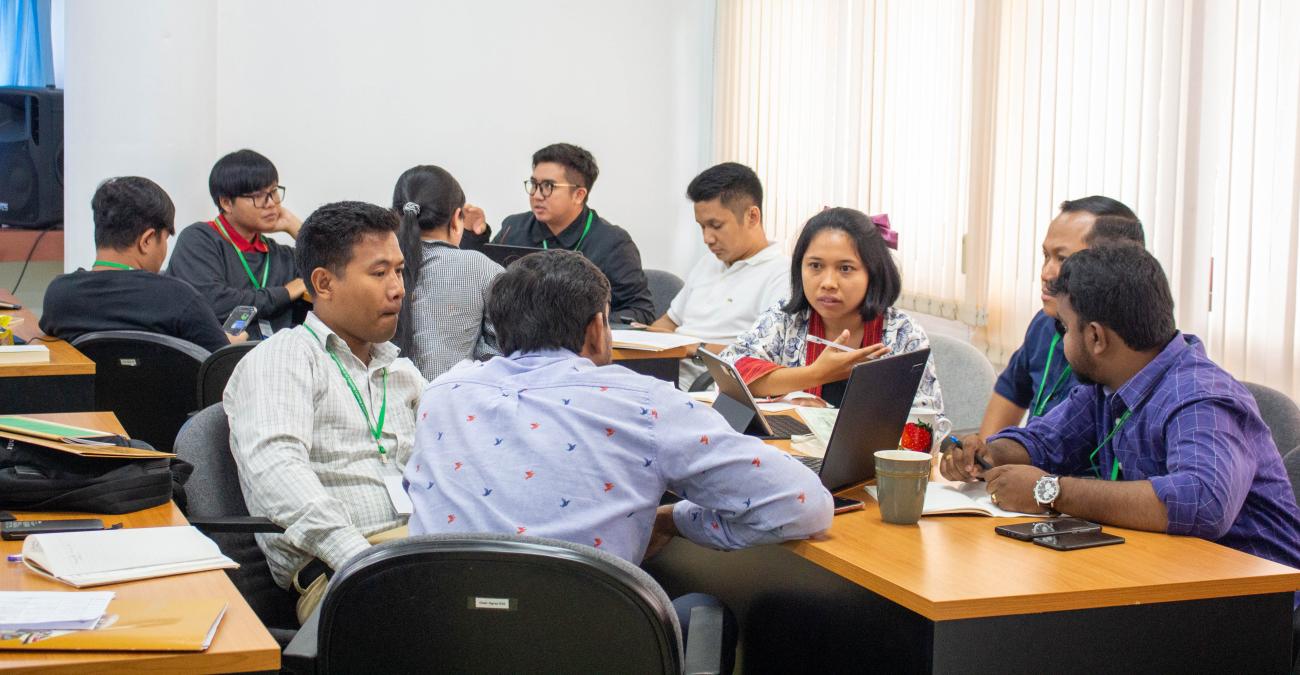
Asian Ecumenical Institute (AEI)–2023
The Christian Conference of Asia (CCA) invites applications for the Asian Ecumenical Institute (AEI), a month-long ecumenical training programme organised annually by the CCA, which focuses on the ecumenical formation and leadership development of prospective Asian youth leaders.
The AEI–2023 will be held in conjunction with the 15th CCA General Assembly in Kottayam, India, from 27 September to 4 October 2023. The intensive month-long ecumenical formation training programme of the CCA will give opportunities for the AEI–2023 participants to attend the 15th CCA General Assembly and other related events such as the Youth Pre-Assembly.
The AEI–2023 will be held from 7 September to 5 October 2023, with two components, online and in-person. The online component of the AEI will be held from 7 to 15 September 2023. Classes will be conducted via online mode on Zoom, on weekdays for three hours each day. The in-person component of the AEI will be held from 21 September to 4 October 2023 (arrivals on 20 September and departures on 5 October). The students will be allowed to participate in the CCA General Assembly from 28 September to 3 October. The valedictory session of the AEI–2023 will be on 4 October 2023.
The theme of the AEI–2023 is “Young Asian Ecumenists for Renewal and Restoration of God’s Creation”. A team of prominent resource persons with expertise at the international level will lead the AEI–2023.
For additional details, please go through the information in the documents below:
AEI–2023: Background Information
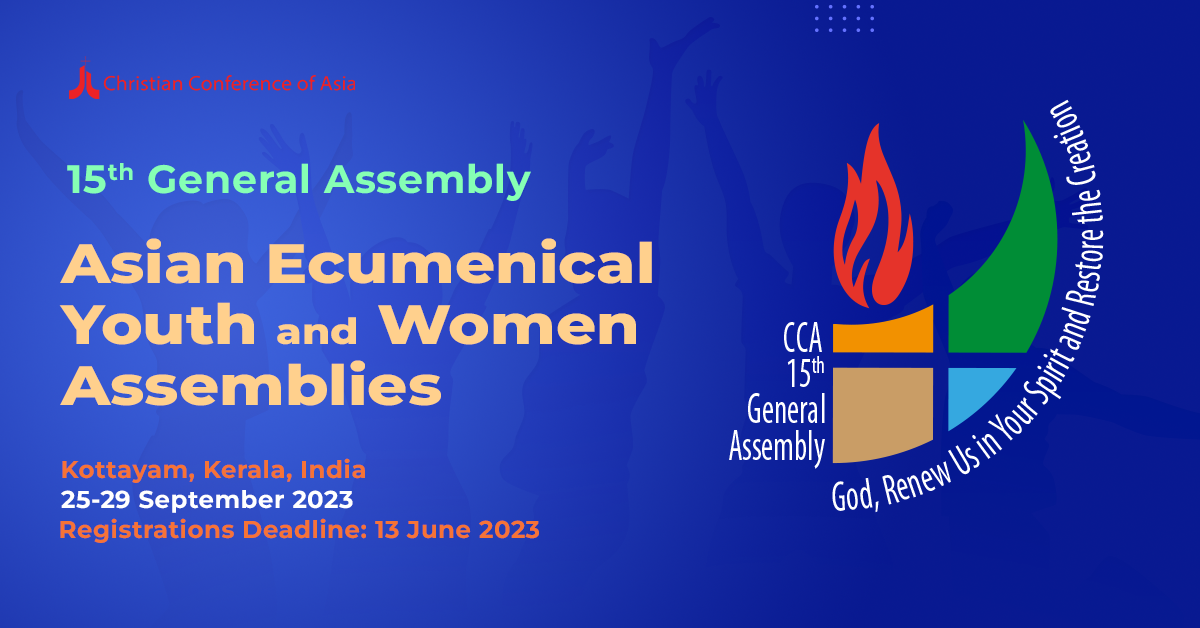
Ecumenical Youth and Women Assemblies-AEYA and AEWA
Chiang Mai, Thailand: The Christian Conference of Asia (CCA) will organise the Asian Ecumenical Women’s Assembly (AEWA) and the Asian Ecumenical Youth Assembly (AEYA) as part of the pre-Assembly events in conjunction with the 15th CCA General Assembly, which will be held in Kottayam, India, from 27 September to 4 October 2023.
The AEWA–2023 and the AEYA–2023 will be held in Kottayam, India, from 25 September to 29 September 2023.
The AEWA–2023 theme ‘Asian Women: Journeying Towards Renewal and Restoration of God's Creation’ is a clarion call for Asian women to deepen their ecumenical commitment and engagement in their journey towards the renewal and restoration of creation. It hopes to build collaboration and solidarity among churches and ecumenical movements toward working for environmental and climate justice and defending the integrity of God's creation.
AEWA–2023 aims to bring together about 100 women participants, including the official voting women delegates representing member churches and councils of CCA, women secretaries of the national councils of churches, representatives of the women’s ministries or programmes of Indian churches, ecumenical partners, and delegated observers from member churches and ecumenical organisations.
The AEYA–2023 theme ‘Asian Youth Affirming Renewal and Restoration of God’s Creation’ will recognise the unique and special role of young people as agents of transformation and hope in the renewal and restoration of creation. Asian youth are well placed to address the world’s most pressing environmental problems as they are intimately connected to their local communities and have a deep understanding of the cultural, social, and economic contexts in which they live.
AEYA–2023 will bring together about 100 youth participants, including the official voting youth delegates representing member churches and councils of CCA, youth secretaries of the national councils of churches, youth leaders from Indian churches, ecumenical partners, special visitors, and Assembly stewards.
For queries, please write to [email protected].
Ecumenical Youth Assembly-AEYA
Ecumenical Women Assembly-AEWA
Stewards Programme
Stewards Programme
The Christian Conference of Asia (CCA) invites applications from young Asians belonging to the CCA member churches and ecumenical councils in Asia to serve as stewards for its 15th General Assembly in Kottayam, India, from 27 September to 4 October 2023.
The stewards will also attend the pre-Assembly youth gathering along with dedicated sessions of ecumenical formation training and orientation. The arrival for the stewards will be on 23 September and departure on 4 October 2023.
The Stewards Programme will bring together a diverse group of 60 young people for the General Assembly of the CCA. Sixty young people (20 international, 20 from India, and 20 from the state of Kerala specifically) will be selected to work together with the CCA staff and local organising committees and will have various responsibilities during the General Assembly.
The Stewards Programme is an excellent opportunity for young people who are passionate about making a difference in their communities to work and collaborate in a multicultural context with other like-minded young Christians from across the Asia region, in a spirit of togetherness and friendship. It is also a platform where young people can interact with a wide range of participants at the CCA’s 15th General Assembly, including church and ecumenical leaders from around the world, theologians, missiologists, social activists, and interfaith scholars.
The working language of the programme will be English.
Past CCA Assemblies
Past CCA Assemblies
The Christian Conference of Asia is the first and oldest regional ecumenical organization in the world. It was constituted by the decision of Christian churches and national councils of churches or national Christian councils, whose representatives first met at Prapat, Indonesia, in March 1957. It was inaugurated at the 1959 Assembly in Kuala Lumpur, Malaysia. The CCA was known as the East Asia Christian Conference (EACC) from its inauguration until the 5th Assembly in Singapore, in 1973.
The journey of the CCA from its inception to the present day can be traced through its General Assemblies and their themes:
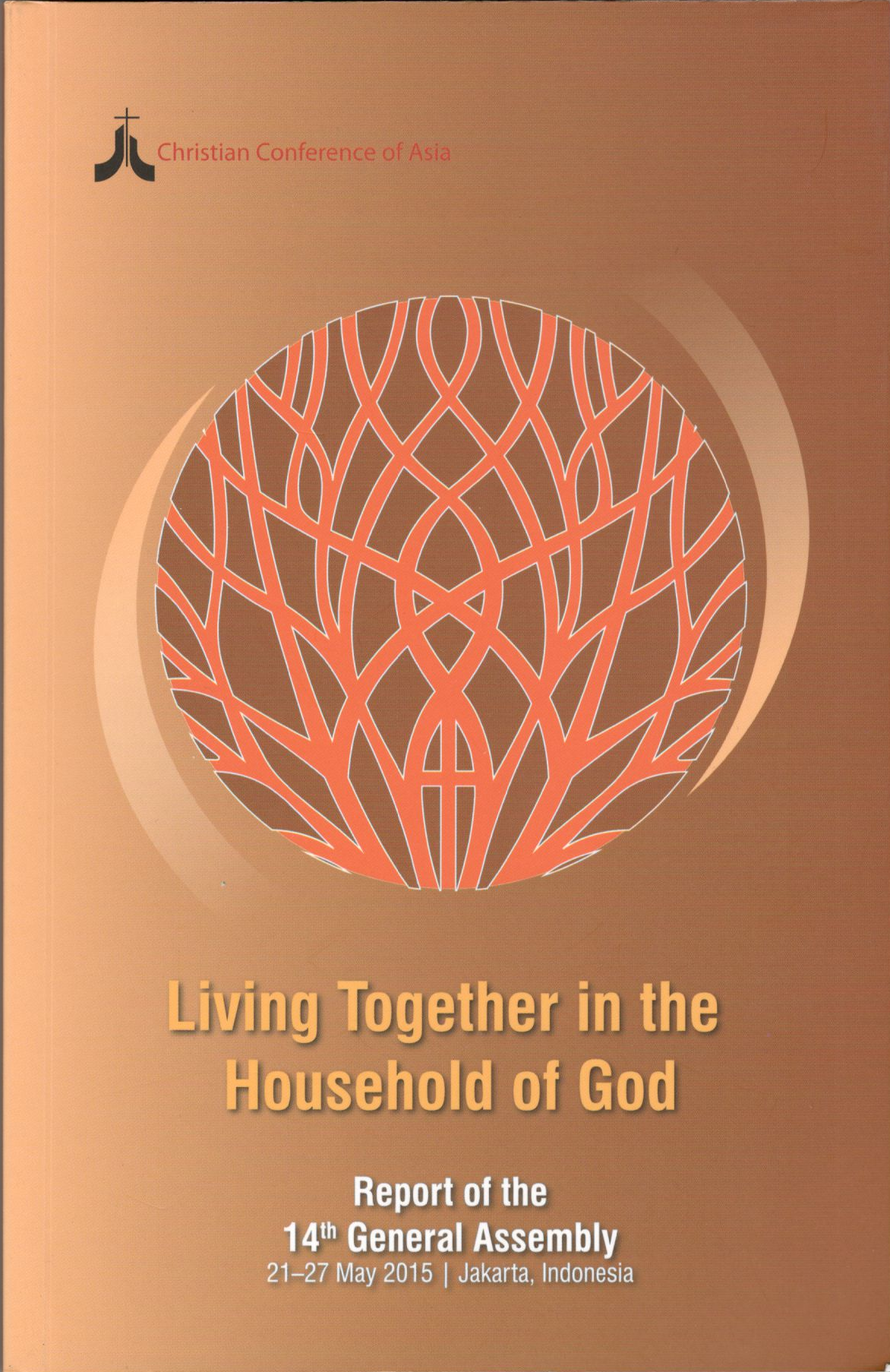
14th Assembly: Jakarta, 2015
Place: Jakarta, Indonesia
Dates: 21 May–27 May 2015
Theme: Living Together in the Household of God
Participants: 452
The Assembly took on a more holistic approach with its theme “Living Together in the Household of God pertinent to the message that the world was created by God was a ‘house’ where all of creation can depend on each other, and live together in peace and harmony.
Thematic presentations in the Assembly focused on theological, geopolitical and interfaith perspectives. In the theological reflections, a call was made for the churches to work together ecumenically and as one. Jesus’ prayer “that they may all be one, so that the world may believe that you have sent me…” was a constant reminder of the need for Christian unity and to together proclaim the prophetic and liberating message of Christ.
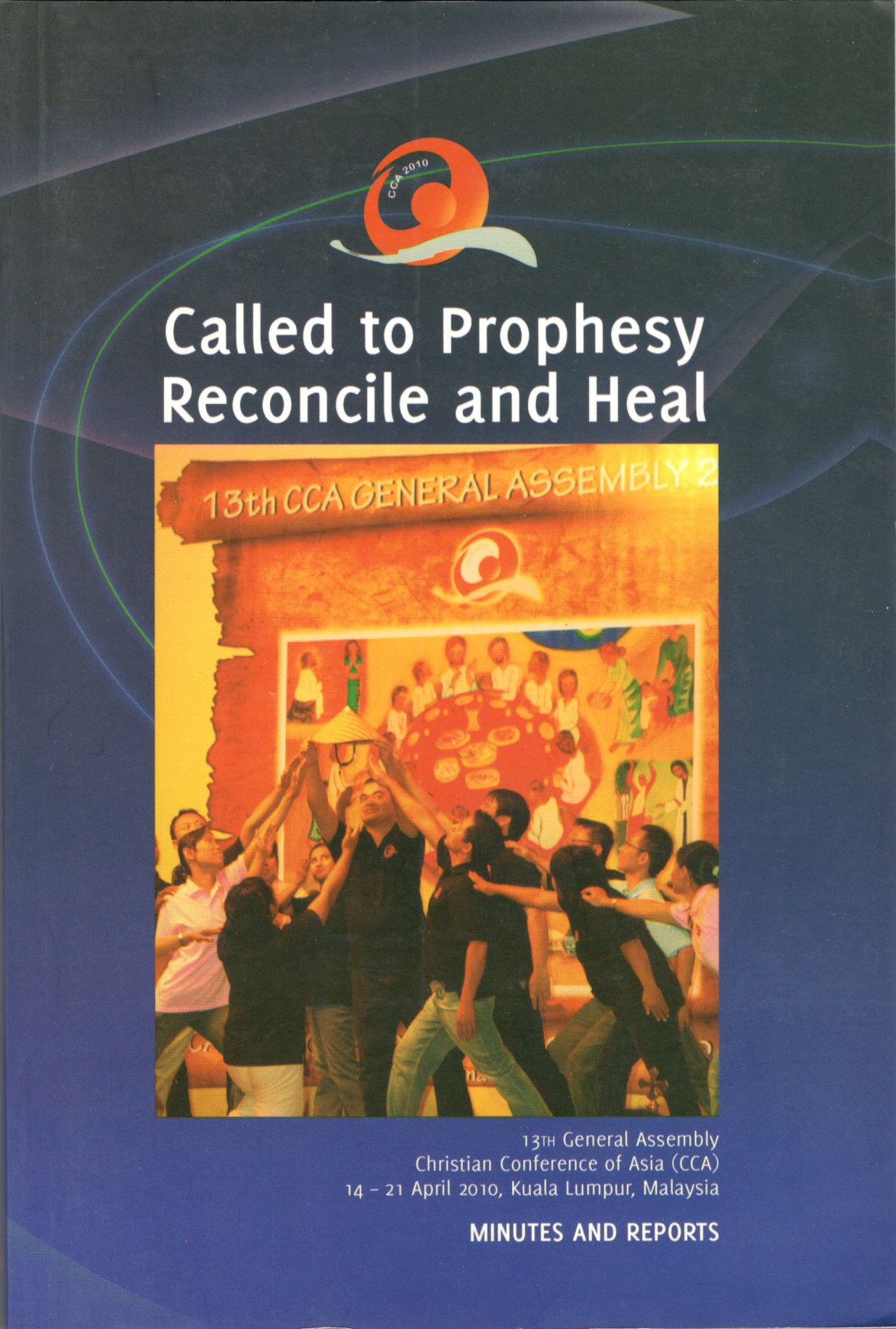
13th Assembly: Kuala Lumpur, 2010
Place: Kuala Lumpur, Malaysia
Dates: 14 April–21 April 2010
Theme: Called to Prophesy, Reconcile, and Heal
Participants: 360
“Called to Prophesy, Reconcile, and Heal” was the theme for the 13th General Assembly of the CCA.
The encouragement and call throughout the assembly were for humanity to grieve on the actions of the past that were filled with bitterness and hatred against each other. Christians in Asia, before being prophetic, must ask God first for the gift of tears that cleanses the eyes to be able to see the suffering and pain in the world which God has created.
The call to prophecy, reconcile and heal is addressed to the Church in the letter to the Corinthians by St. Paul. He reminds the various factions and groups in the church that they are called to be a community growing in reconciliation. In the assembly, this call was deemed relevant to the churches 2000 years apart.
In the first session of the D.T. Niles memorial lecture, it was highlighted that costly discipleship was the consequence of prophetic ministry and a component of it. The second session encouraged the idea that reconciliation and healing were not a “welfarist model of work” of the churches, but was a political engagement with people, ideologies, politics and identities.
The biblical reflections enriched the theme of the assembly with deep and relevant insights. The need to look back to the first-century church was highlighted as to how they lived up to a prophetic counter vision. The first church was sensitive to the needs of others and practised the ‘economy of sharing’. This praxis entailed an alternative economic vision which stood as a contrast to the dominant economic norm of the present era. Furthermore, the biblical reflections also focused on the Trinitarian state of being - of a perfect relationship between God, humanity and the entire creation. The bible studies proposed that reconciliation was more than a mere ‘conciliation’, it is a cosmo-theandric vision.
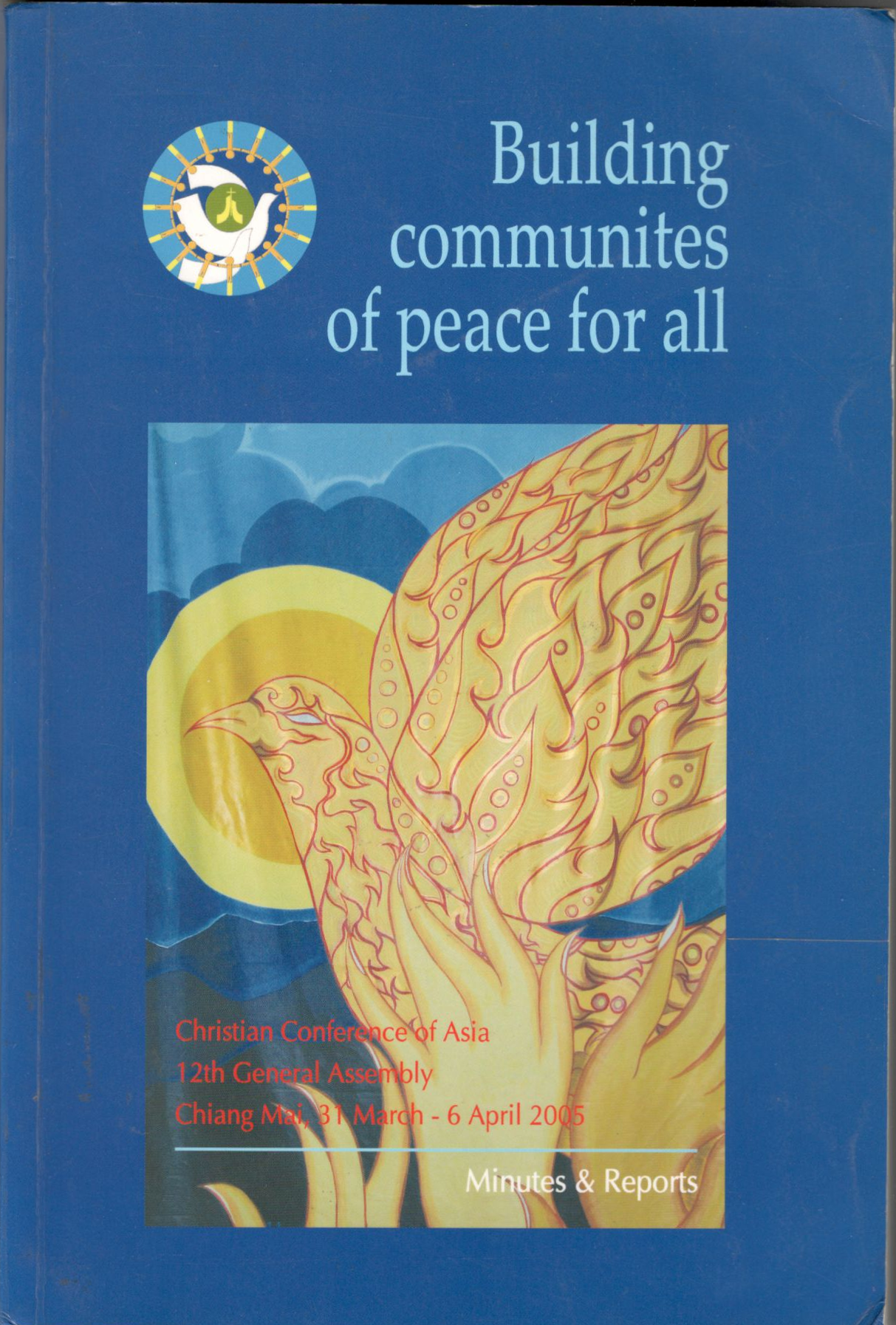
12th Assembly: Chiang Mai, 2005
Place: Chiang Mai, Thailand
Dates: 31 March–6 April 2005
Theme: Building Communities of Peace for All
Participants: 436
Lectures were delivered on the broader theme of ‘Listening to the Voice of God’, and included ‘New Trends in the Ecumenical Movement’, ‘Building Communities of Peace’, and ‘Geopolitics in Asia: An Overview’. Bible studies were on ‘Visioning Peace in our Communities’, ‘Imagining God in Our Communities of Women and Men’, and ‘Breaking Down the Walls of Hostility’.
Excerpt from the Report of the Presidium:
“Asia is often named as a continent of peace-loving people. We are used to enjoying smiling faces as we travel around Asia, and warm hospitality extended by people who may not have the most resources to share with others. And yet, peace, so obvious a value we all treasure and a desire in all of us has come so far from sight in many of our communities. The threat to peace is something not unfamiliar to us…There is much room for us to envision peace and for the renewal of commitment to building it for the future of our communities, for the very precious lives of our families, women and children and the earth. This will be the task of this Assembly here…”
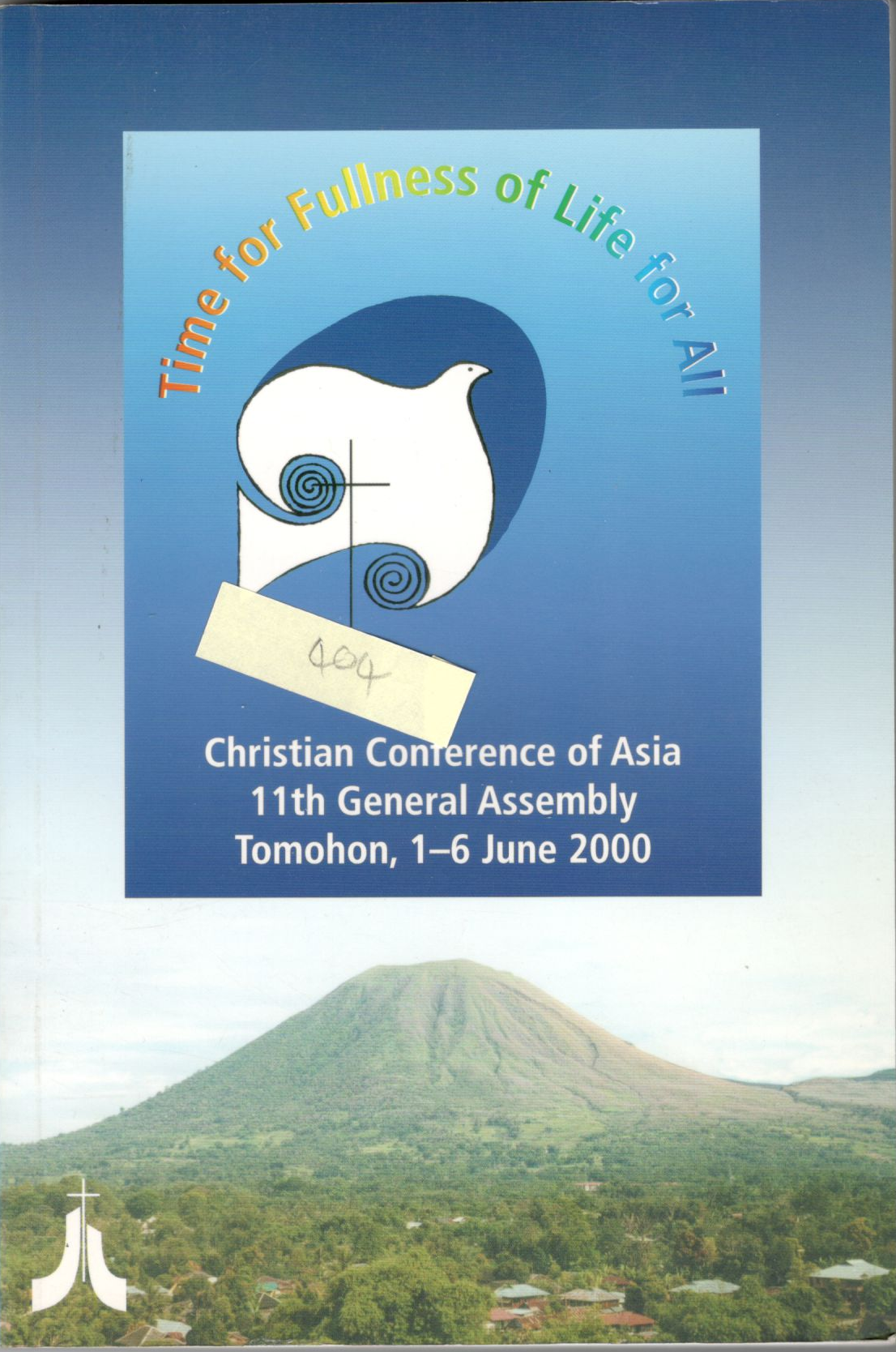
11th Assembly: Tomohon, 2000
Place: Tomohon, Indonesia
Dates: 1–6 June 2000
Theme: Time for Fullness of Life for All
Participants: 757
Presentations were made on ‘Time for Fullness of Life for All’, ‘For Such a Time as This: Our Moment in God’s Time’, and ‘New Communities in the New Millennium’.
Excerpt from the Report of the General Secretary:
“Like the pioneers of the ecumenical movement, the pressure of God’s calling and of changing conditions ask us to think again of the nature and character of the ecumenical movement, the leadership it needs and should have, its people and constituencies, its role in a vastly changed and changing world, and its structure and its relationship with the churches. What does it mean for the ecumenical movement to be “of the church” and of ecumenical life as an expression of “being church” amidst all of Christ’s churches? What does it mean for the ecumenical movement and the church to be “of Asia”, changing vastly and reinventing itself, as some have said? What does it mean to be ecumenical in an intensely religiously plural work…what does it mean to be “the people of God amidst all God’s people”?...What would it mean in terms of our fellowship, our structures, our perception of mission, and our relationships, our social witness and the sources of our support? What does it mean to be ecumenical and to be the church in Asia at a time when the geoeconomic and political map of the world is being redrawn and where Asia is becoming in fact “world”?
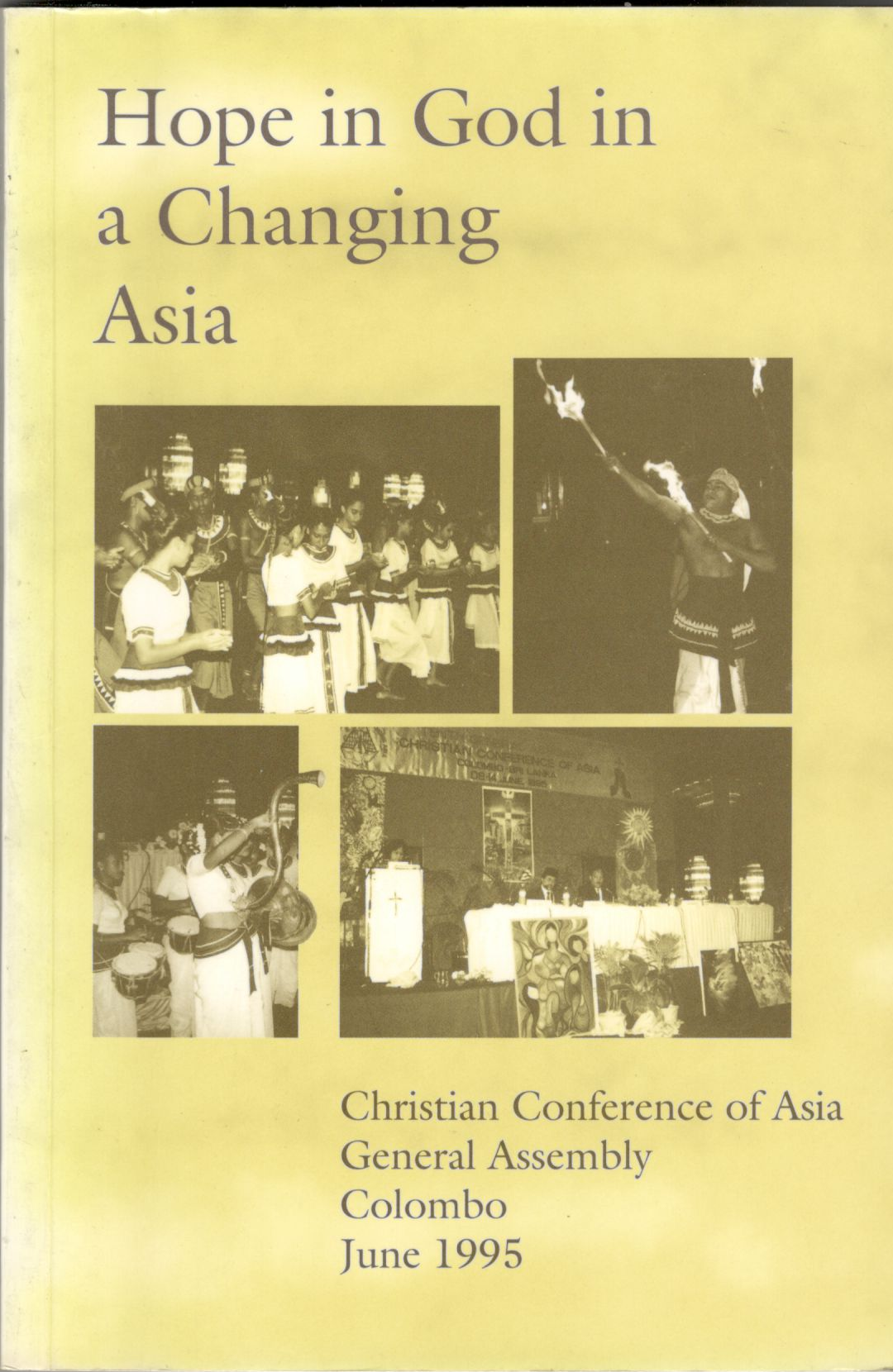
10th Assembly: Colombo, 1995
Place: Colombo, Sri Lanka
Dates: 8–14 June 1995
Theme: Hope in God in a Changing Asia
Participants: 373
Presentations were made on ‘Hope in God in a Changing Asia: Emerging Socio-Economic and Political Issues’, ‘Hope in God in a Changing Asia: A Theological Reflection’, and ‘Hope in God in a Changing Asia: Church Renewal’. A Lecture was delivered on ‘Religious Fundamentalism and the Culture of Non-Violence’. Bible studies were on ‘God makes No-People of the World as Partners in the Struggle for Justice’ and ‘Intact Communion of Christians: Pre-condition for being the True Bearers of Hope’.
Excerpt from the Report ‘Direction for the Future: Hope in God and Church Renewal’:
“Hope in God in a Changing Asia” is an important theme as the church approaches 2000. For people outside the church, do we represent hope?... Church renewal is the result of the work of the Holy Spirit’s divine power and human power combined in renewal. It is an ongoing journey, with personal and corporate aspects. The warning is that the church can be bound by tradition and structure and thus have difficulty in addressing current issues e.g. gender bias. Renewal will come as the church interprets its mission in the light of its response to social justice issues, such as child abuse, and exploitation of labour."
In a changing Asia, the following issues affect the church renewal:
- the rapid change in society;
- a need for security as people move from rural to urban areas, expressed in clinging to traditional ways and worship;
- presenting an authentic understanding of the gospel and theology in a modern context;
- the church should be integrated with and not separate from society;
- the fear expressed by adults in dealing with understanding youth.
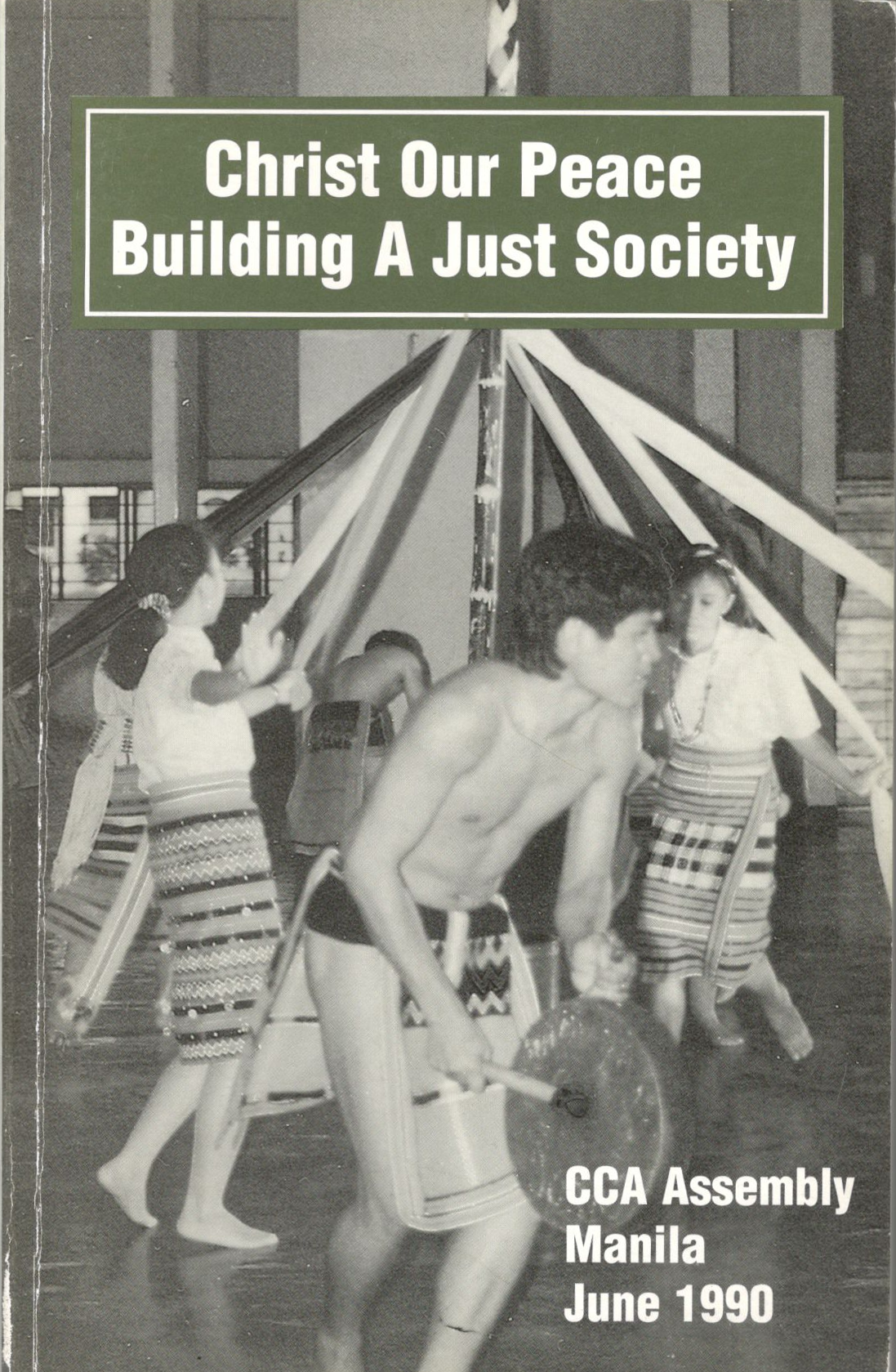
9th Assembly: Manila, 1990
Place: Manila, the Philippines
Dates: 4–12 June 1990
Theme: Christ Our Peace: Building a Just Society
Participants: 451
Three lectures were delivered on ‘Toward a Convivial World’, ‘Women and Men in Community: Rhetoric or Reality?’ and ‘On Being a Christian and Asian in the Present World Economic Order’. Bible Studies were conducted on ‘The Concept of Shalom in the Old Testament’, ‘Peace and the New Human Community’, ‘Called to be Peacemakers’, and ‘The Kingdom of Peace and the Ministry of the Church’.
A report from the Assembly reads:
“The facts that Christianity is an Asian religion and that it has had, since the first century AD, some roots in our soil, are often overlooked and ignored. Particularly in those countries of Asia with a colonial history, the Church (and Christians generally) are still looked upon as “vestiges” of past colonial masters and often treated with suspicion and derision. Christians, especially where they are found in minority situations, are also often associated with some covert design running contrary to the mainstream of Asian thought, aspiration, and values. It is amidst these perceptions (right or wrong) that the issue of the Asianness of the Church or an Asian Christian Identity is to continue to be a serious search for the Church in Asia.
“A genuine and sensitive ‘Asian Christian’ identity as a manifestation of the unity of the Church in Asia will contribute to the quality and the strength of the larger Asian people’s identity. The Asian Christian identity (encompassing within itself various differences in creative tension) will, in turn, be a credible and authentic component of the larger Asian perspective and reality of unity amidst diversity.”
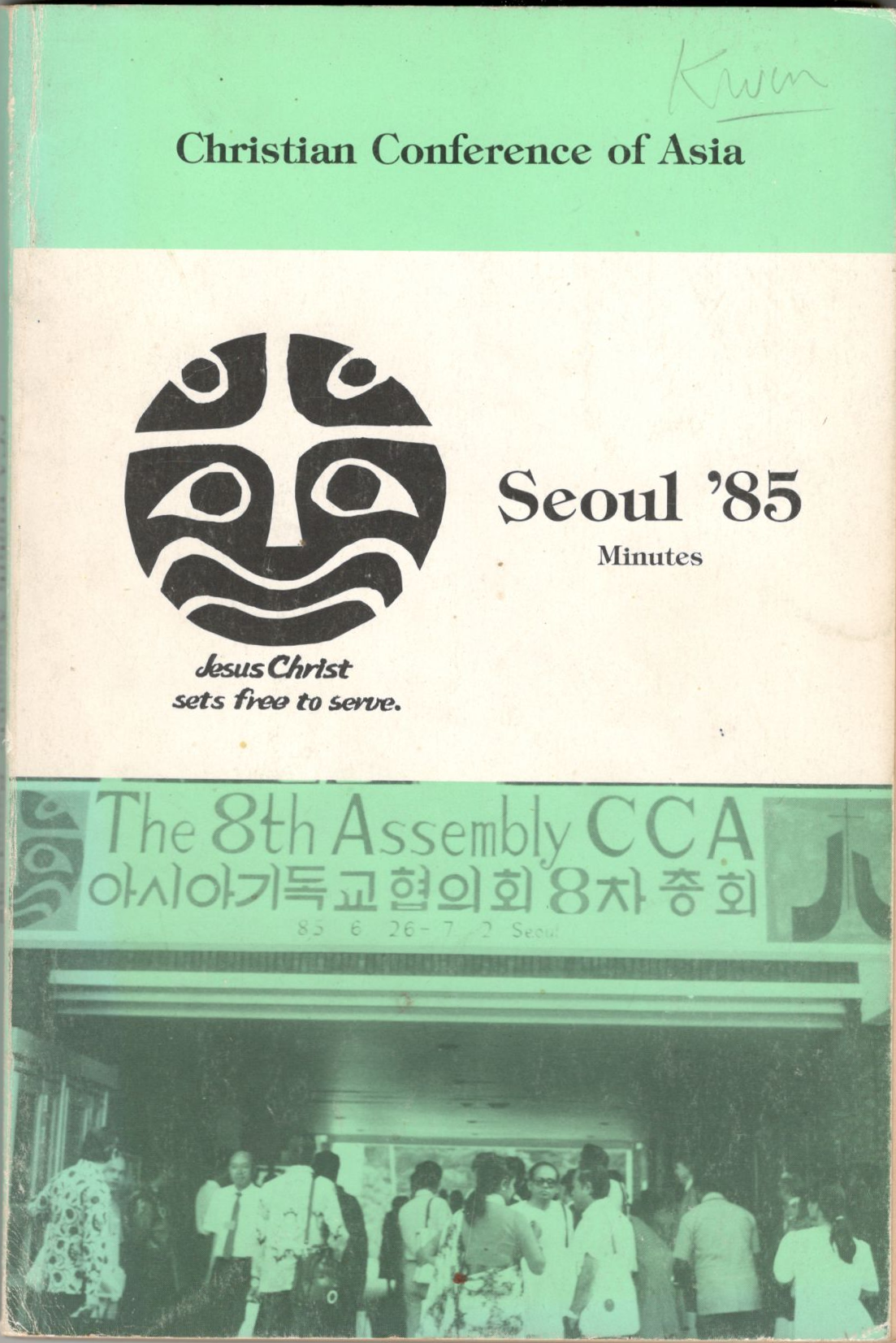
8th Assembly: Seoul, 1985
Place: Seoul, Korea
Dates: 26 June–2 July 1985
Theme: Jesus Christ Sets Free to Serve
Participants: 360
A report from the Assembly reads:
“Christ sets us free from idols into the freedom to believe in the God who created us, and made the ultimate sacrifice that we may truly be what we are. We affirm this in the face of situations where it is forbidden to believe other than what society or culture provides. This is an affirmation that must be made in the midst of worldly powers—political or religious—that bar the recognition of the Father of our Lord Jesus.
“Christ sets us free to worship God and acknowledge him as the most worthy of adoration and praise. We make this affirmation in the face of cultural values that push us to worship the things God has created and to turn away from God himself. Christ has set us free to claim and renew what is of value in our culture and societies and incorporate them into the new life and the new future that we have in him.
“Christ sets us free to love and care for our peoples, particularly those who are poor, oppressed, exploited, marginalised, and to struggle with them to find the new life that is promised in Christ. We must affirm this in the midst of Asian societies in the clutches of an ethos of greed and domination, where the great power and wealth of a few are made possible through the misery of the many.
…The ground of our freedom is the holy, loving, and righteous God who became incarnate in His Son Jesus Christ and dwelt among us, and struggled with and showed his great love for us by his crucifixion, and conquered the evil powers that enslave and oppress, by his resurrection. To have faith in this God open us to the indwelling of the Holy Spirit who leads us into all the truth about ourselves and our world, and about the life that shall be ours in the Kingdom of God. It is the Holy Spirit who leads us into the future as we exercise our freedom in Christ in service to the least of our brethren.”
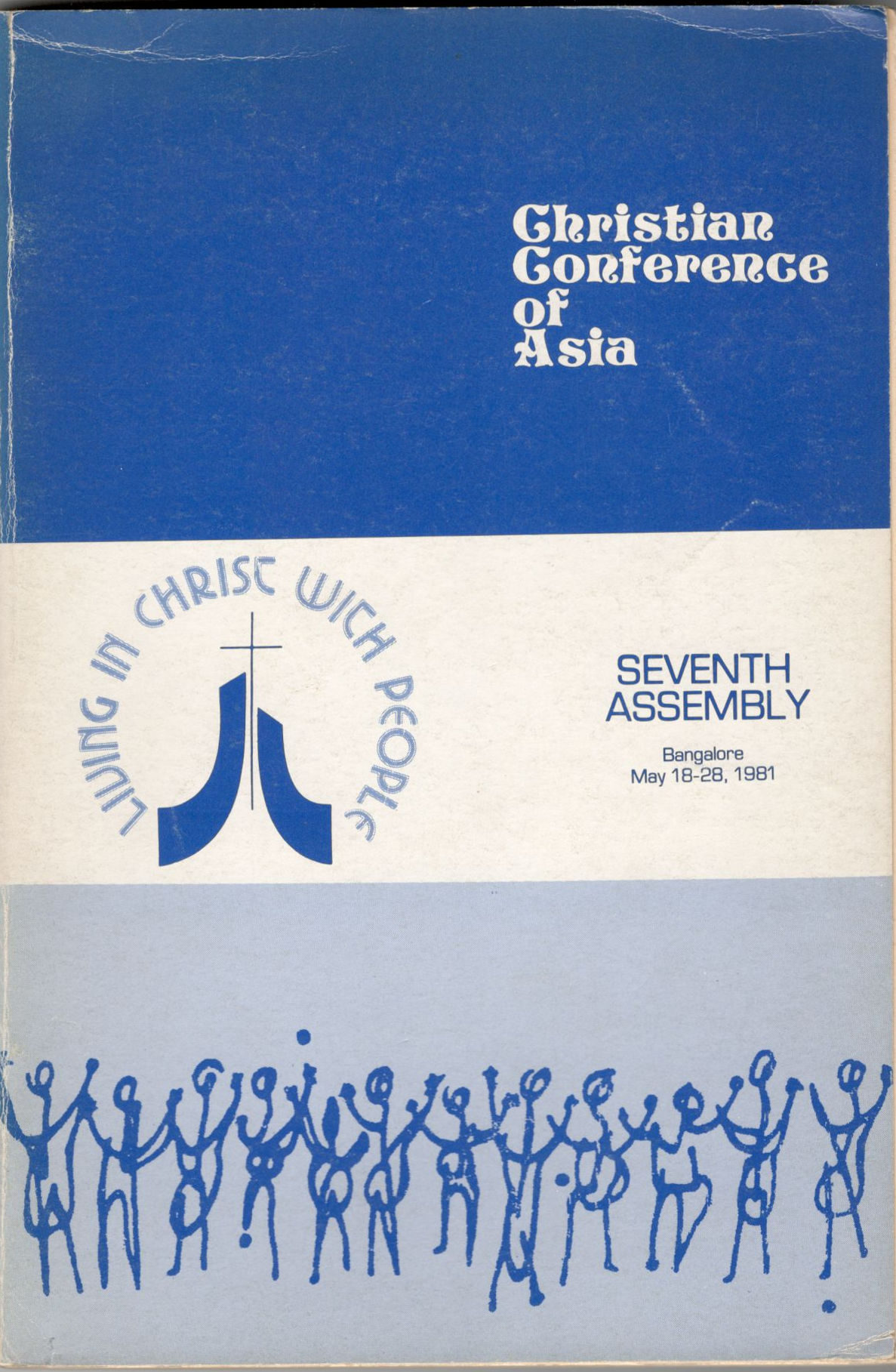
7th Assembly: Bangalore, 1981
Place: Bangalore, India
Dates: 18–28 May 1981
Theme: Living in Christ with People
Participants: 351
Programmatic work was discussed under the groups ‘Confronting the structures of power’, ‘A call to the community’, ‘For the renewal of the Church’, and ‘Meeting Asia’s emerging challenges’.
A report from the Assembly reads:
“It is Christ who calls us to the community. It is Christ who is the centre of Christian communities, and in faith, we also believe that no human community is outside the love of Christ. If that is what we believe, then, every Christian community at all levels—local, denominational, national, and international—is, at the same time, part and parcel of the broader human community.
“We are called to a fully and truly human community only through Christ because in Him “there is neither Jew nor Greek, there is neither slave nor free, there is neither male nor female”. People who are really in a community are people who belong to one another, care for one another, and share with one another. Through creative interaction and tension, the community draws together despite differences.”
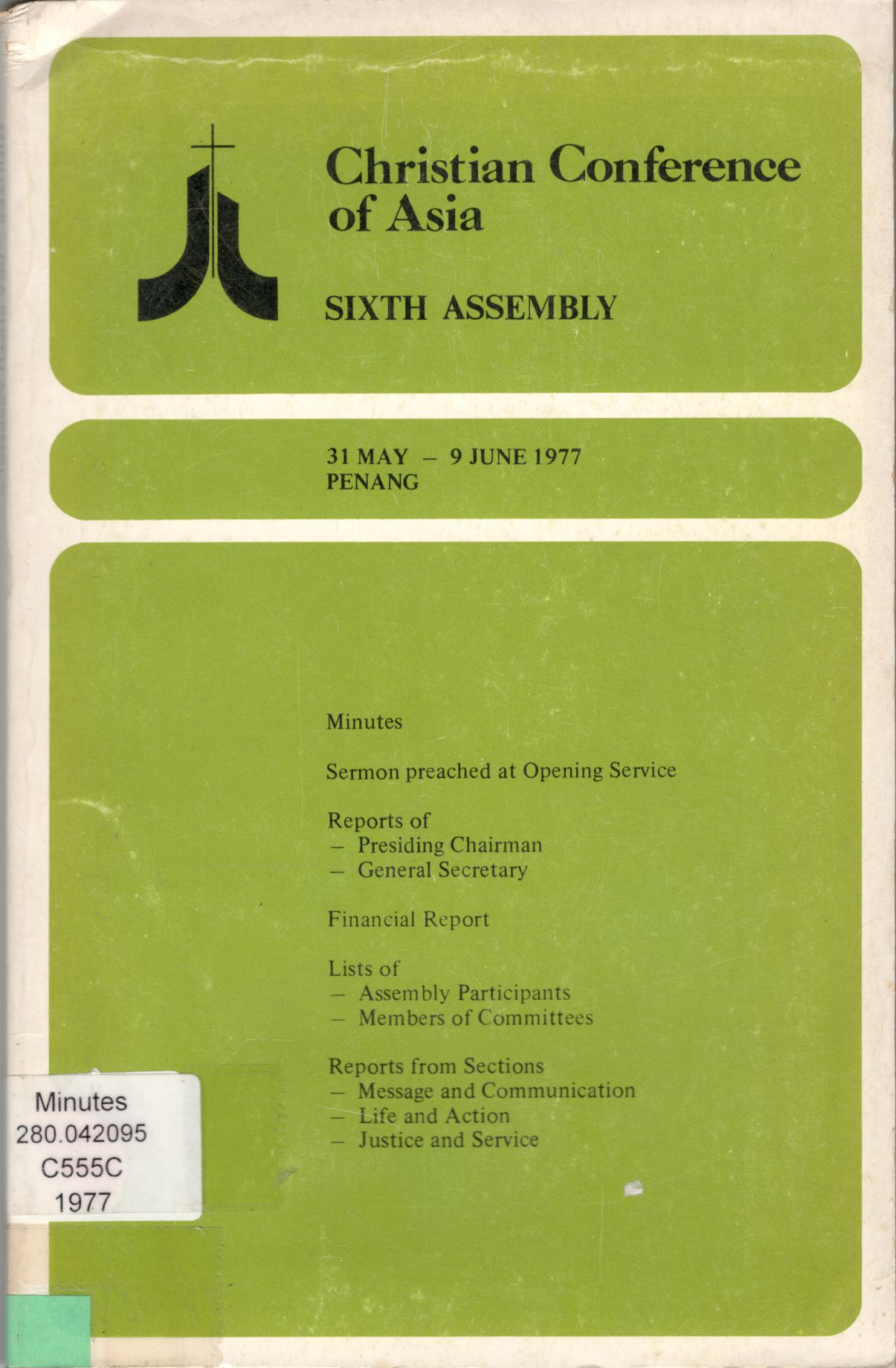
6th Assembly: Penang, 1977
Place: Penang, Malaysia
Dates: 31 May–9 June 1977
Theme: Jesus Christ in Asian Suffering and Hope
Participants: 419
Lectures and bible studies revolved around the theme and discussions centred on the theme, ‘Jesus Christ in Asian Suffering and Hope’.
Salient issues raised at the Assembly include:
- The need to develop an Asian theological framework within which Asian Christians may pursue their social tasks creatively and interpret the Asian realities of the present time.
- The role and place of women and youth in churches and in international ecumenical gatherings.
- A greater emphasis on the cultural and religious aspects of our societies in Asia.
- A greater emphasis on the vital role of worship in the nurture of the community of faith.
- The problem of cultural imperialism.
- The need to develop closer relations with minority churches in special situations.
- The need to highlight the central task of appropriating and proclaiming the gospel message.
- The development of more mature ecumenical relations between Asian churches and their overseas partners.
A message from the Assembly profoundly reads:
That people are not to be wasted, people are valuable.
Made in God’s image,
Redeemed by the Christ who died for them,
People have his promise of abundant life, not wasted life.
Therefore, we affirm
That God is a living God, the God of love and acceptance;
That the Spirit of God works with his people in freeing and uniting them;
This is our message.
To share our new life by Word and Action;
To share His lifestyle through style;
To offer His hope by offering ourselves in proclaiming the Gospel;
To share Christ thus is our mission.
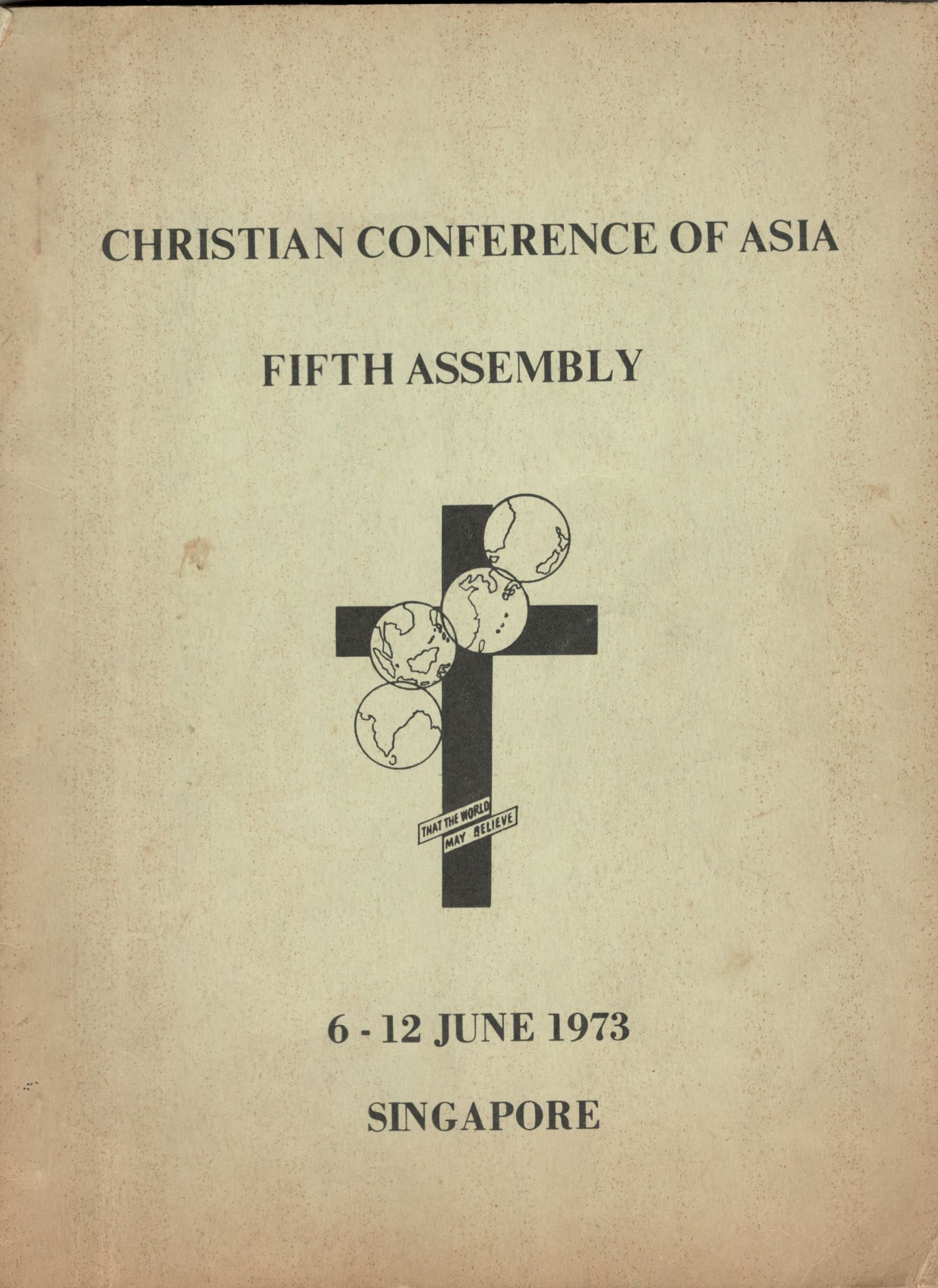
5th Assembly: Singapore, 1973
Place: Singapore
Dates: 6–12 June 1973
Theme: Christian Action in the Asian Struggle
Participants: 289 participants
The 5th Assembly was a landmark Assembly in the life of the organisation, it was when the East Asia Christian Conference (EACC) formally changed its name to the Christian Conference of Asia (CCA). It was also the first time that insistence was made about spreading out the representation at the Assembly among church executives, laity, women, and youth under 27 years of age.
Sessions at the Assembly included ‘The Asian Struggle’, ‘Christian Action in the Asian Struggle’, ‘The Struggle for Justice, Liberation, and Development’, ‘Renewing the Church for Christian Action’, and ‘Forward in Ecumenism’. Further issues on ‘Message and Communication’, ‘Life and Action’, and ‘Justice and Service’ were considered in groups.
A message from the Assembly on ‘Message and Communication’ reads:
“We believe that the purpose of God for the church in Asia is life together in common obedience to Him for the doing of His will in the world. We also affirm that His purpose for us is that we are involved in the struggles of Asia—struggles of poverty, injustice, and oppression. In the midst of this Asian situation, we have sought to hear God’s call to us toward unity, mission, and communication.”
Another message from the Assembly on ‘Justice and Service’ reads:
“How is the Christian responsibility for justice and the struggle towards it to be concretely manifested in such situations? What priorities are to be set forth for the variety of service programmes among people who are becoming self-aware? What visible international concern of the Christian church is to be found in the struggle of the afflicted people of Asia? And to what extent, in the midst of all this, should the churches also continue to respond to the perennial needs of people who suffer under natural calamities and disasters, which recur so frequently, and the victims of a human conflict whose visions are often limited by circumstance to survival and existence?
“These questions call for a continuous and drastic re-examination of the orientation and content of the service programmes and social projects of the churches, and for the courage and openness to participate alongside the struggling people in the process of humanisation. The era of great statements is over: now is the time for action. Christian action in the Asian struggle will take place concretely as Christians participate in the struggles of the peoples of Asia for the total liberation and fullness of life promised by God.”
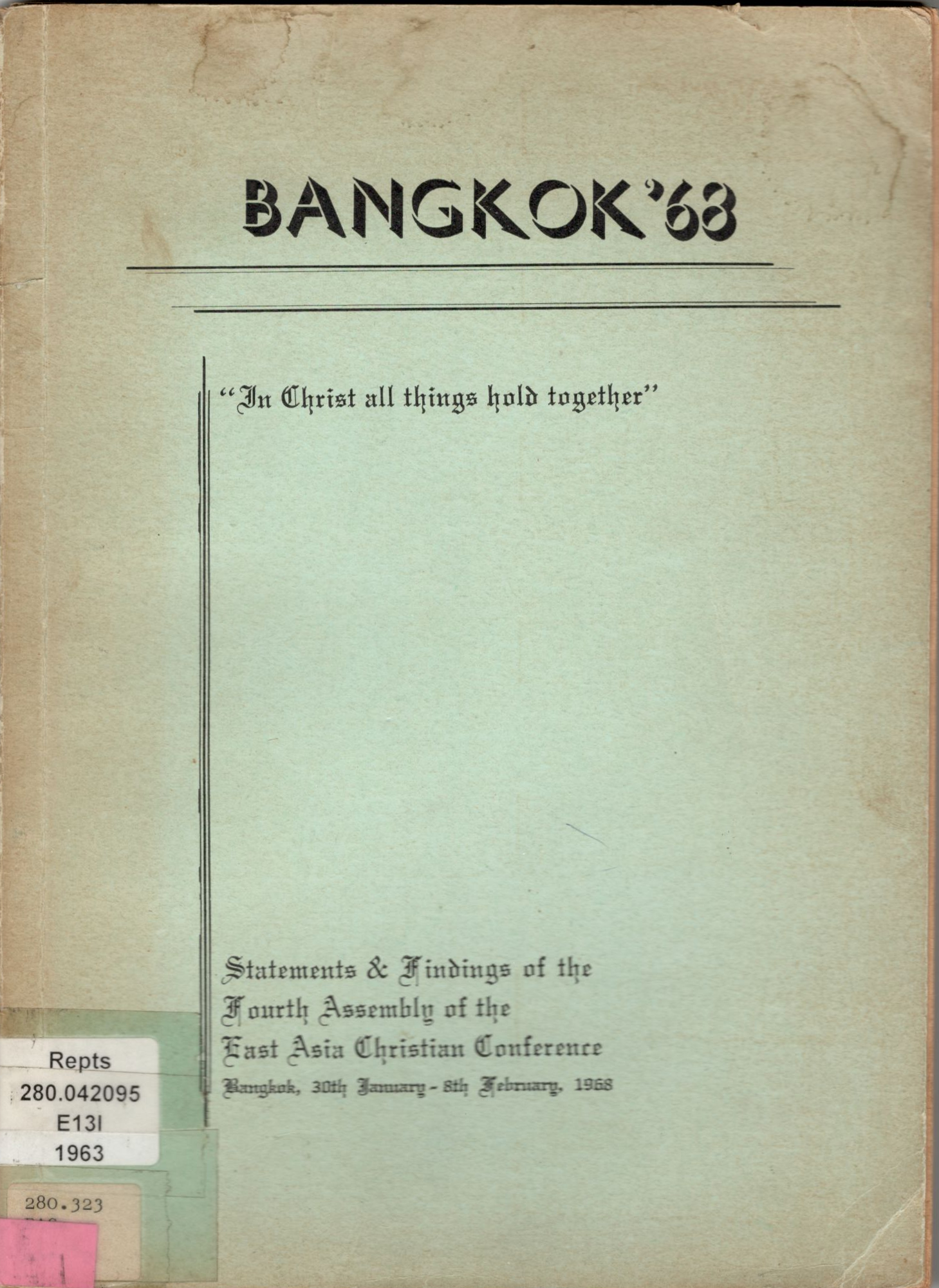
4th Assembly: Bangkok, 1968
Place: Bangkok, Thailand
Dates: 30 January–8 February 1968
Theme: In Christ, All Things Hold Together
The Assembly made its primary concern the addressing of ' a divided church in a broken world' through topics such as ‘the Christian presence in a broken world’, ‘making the Christian presence effective’, ‘the divided church’, ‘absent brethren’, and ‘ecumenical cooperation’. Other issues dealt with economic development, politics and international affairs, corruption, war, society and culture, family life, urban-industrial and rural life, youth, laity, and education.
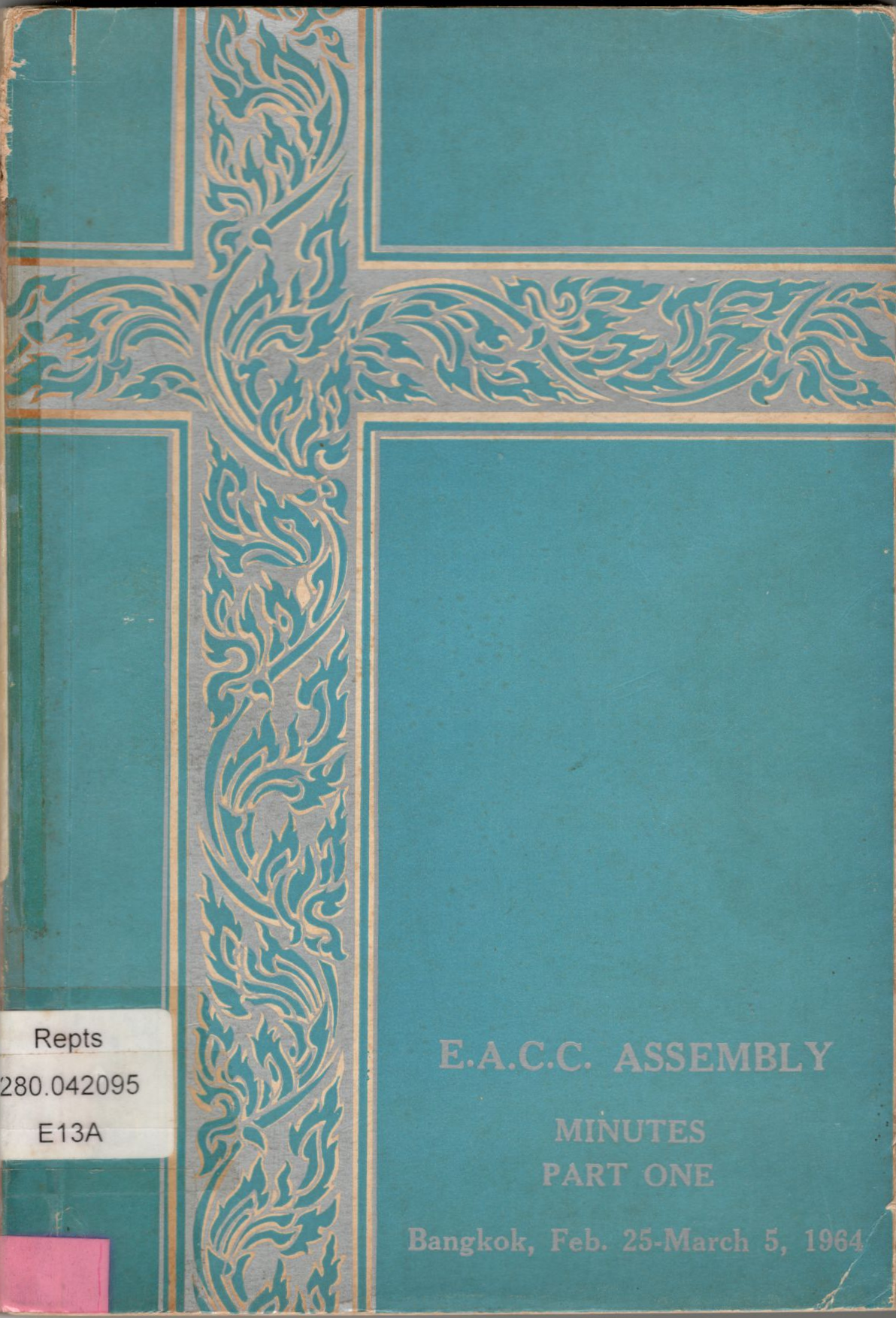
3rd Assembly: Bangkok 1964
Place: Bangkok, Thailand
Dates: 25 February–5 March 1964
Theme: The Christian Community within the Human Community
Participants: 164 participants
The Assembly convened around the theme ‘The Christian Community within the Human Community’. In the opening address, Bishop E.C. Sobrepena, Chairperson of the EACC, chose as his theme the scriptural calling to ‘a unity of the spirit’. “It was a demand,” he said, “for full obedience from the churches to manifest their oneness in every way open to them.”
The two major concerns during the Assembly were ‘the problems arising from the dialogue of the Church with the world’ and ‘the issues which the Churches must face in their call to renewal’.
Keynote lectures were on ‘Making Jesus Known’, ‘Understanding the Tides of History’, ‘The Joy of the Kingdom of God’, and ‘The Cultivation of the Christian Life’. Bible studies centred around ‘the discipline of worship’, ‘the discipline of faith’, ‘the discipline of service’, and ‘the discipline of love’.
Statements issued by the Assembly included:
- The Christian Community within the Human Community
- Christian Encounters with those of other beliefs
- The Call to Holy Living
- The Call to Renewal in the Church of Asia
- Asian Mission
- Confessional Families and the Churches in Asia
- On Relations with Roman Catholics
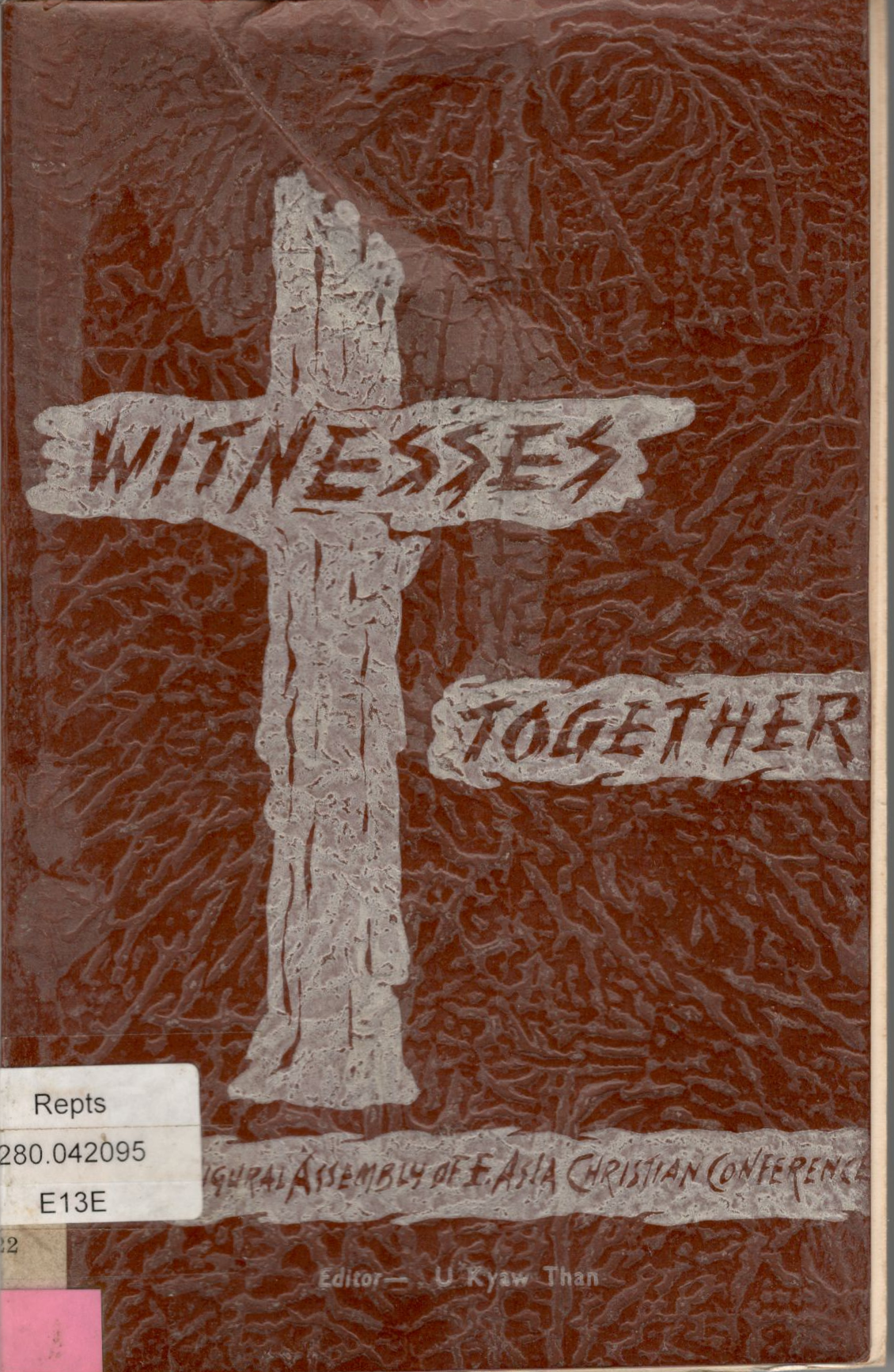
2nd Assembly: Kuala Lumpur, 1959
Place: Kuala Lumpur, Malaya (Malaysia)
Dates: 14–24 May 1959
Theme: Witnessing Together
Participants: 176 participants
“‘Therefore ye are my witnesses,’ said the Lord”: these words from Isaiah formed the text for the concluding sermon preached by Rev. Frank Short at Prapat in 1957, as the delegates of the first Assembly dispersed to their home churches after adopting a plan to propose the establishment of a regional body to be called the East Asia Christian Conference as ‘an organ of continuing fellowship and cooperation among the churches and Christian councils in East Asia’. Pursuing this call to mission and unity, the 2nd Assembly of the EACC met under the theme ‘Witnesses Together’ and reaffirmed their utter dependence on Christ, to whom they witnessed, and their inescapable need for one another as members of their one Lord’s body.
Different sessions dealt with the Church’s call to Mission, to Unity, and to Service. The speakers dealt with the different pathways of action within the ecumenical and missionary movements as ways of obedience to this call. They sought also to understand the implications of this call for the churches of Asia, and to show the relation of the same to the development of self-hood. Background addresses also touched upon the themes of a new understanding of the world, a Christian interpretation of the development of nationalism in Asia, the resurgence of ancient religions, and the Church’s mission in Asia in terms of the new forms of church interdependence.
Delegates discussed in groups programme areas in relation to witness of the laity, inter-church aid in Asia, Christian literature and mass communication, and the nurture of youth through biblical and theological education.
Ending the Assembly, Dr D.T. Niles spoke of the good news in Christ in terms that the ordinary man-in-the-street could appreciate and understand, and related how at times the Church’s theological affirmations required simplification for getting the basic message across to the ordinary person.
The Kuala Lumpur Assembly sent a special message to its member churches and councils, a portion of which reads:
“...Christian people must go into every part of the life of our peoples, into politics, into social and national service, into the world of art and culture, to work in real partnership with non-Christians, and to be witnesses for Christ in all these realism. It means that every Christian must recognise that his primary service to God is the daily work he does in the secular world. It means that we must give our minds to the task of understanding what God is doing in this world, so that Christians engaged in these secular tasks may have guidance and help in the decisions they have to make, and so that the Churches may be ready, when necessary, to speak a prophetic word of warning and encouragement to those in authority and to the peoples.”
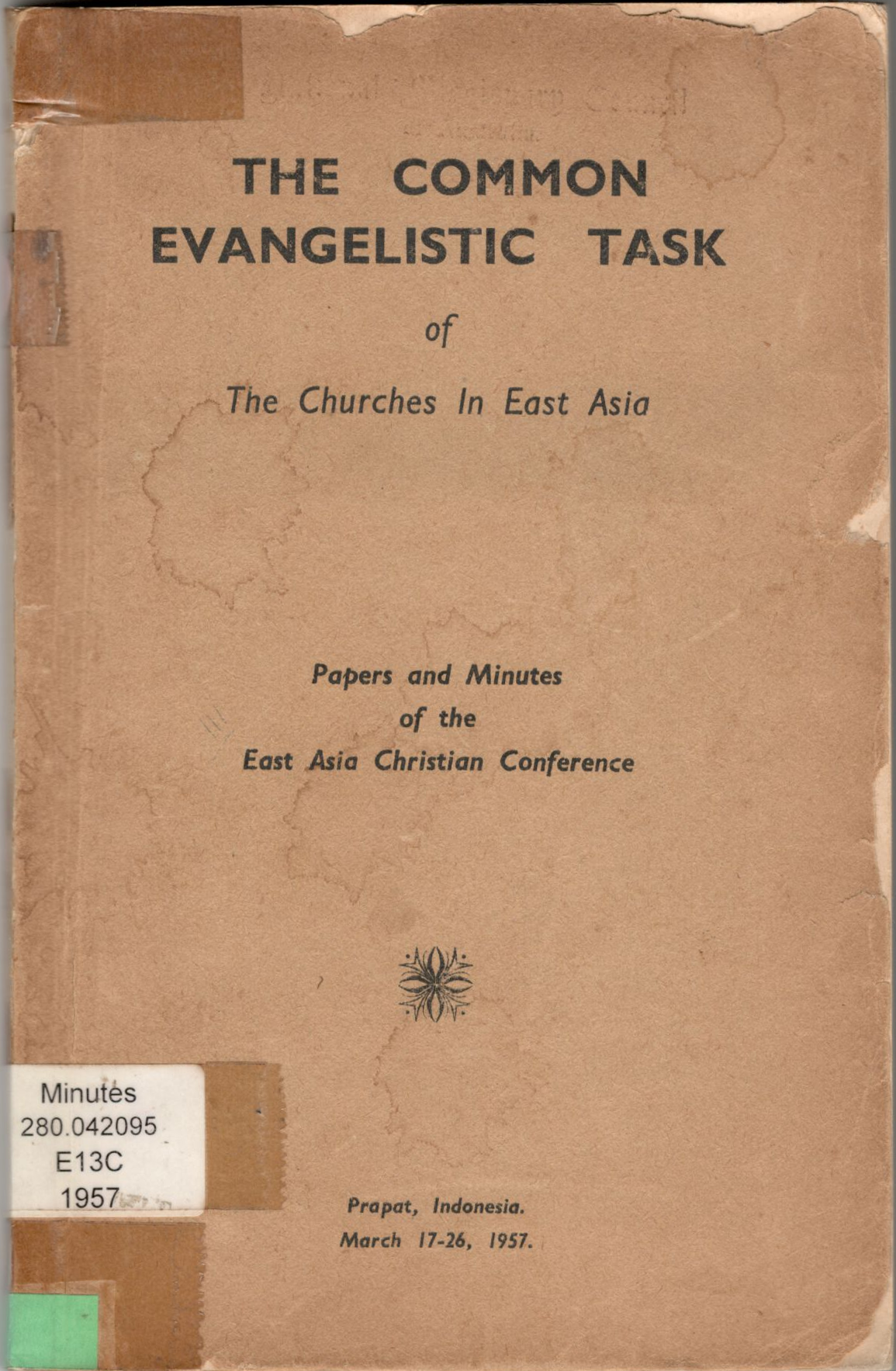
1st Assembly: Prapat, 1957
Place: Prapat, Indonesia
Dates: 17–26 March 1957
Theme: The Common Evangelistic Task of the Churches in East Asia
Participants: 107 participants
Prapat is a small fishing village in North Sumatra, Indonesia, on the banks of the beautiful crater lake Toba in the mountains. Prapat itself means ‘coming together’.
The theme of the Prapat Assembly, ‘The Common Evangelistic Task of the Churches in East Asia’, was not a definition of a goal to which the churches were to move, but was a starting point as they manifested in their life and mission the already-given unity because of their common membership in the body of Christ. The Bible Studies during the Assembly focused on the ministry of the Apostle Paul, centring especially on the meaning and content of the total Christian mission, helping to re-emphasise the nature of the common task of churches all over the world. The Prapat Assembly was therefore an act of faith and obedience on part of the churches in Asia and the rest of the world.
The Assembly spent most of its first two days surveying the situation of the churches in Asia. The circulated reports from the different churches and questions during each session on surveys helped the delegates to get a general idea of the variety of the total Christian situation in Asia.
In his speech, Dr D.T. Niles of Ceylon, who was elected as the first General Secretary of the CCA, spoke of churches and ‘missions’ as instruments of evangelism. The unity of the church was determinative in its mission.
Relations between the regional and the ecumenical, between churches and missions, between service, fellowship, and proclamation in the total Christian mission, organisation, and community, the form and content—all these were very much in the minds of the churches and councils which sent their delegates to the Prapat Assembly.
As the first Assembly drew to a close, the Batak congregation of 200 members at Panahatan brought the first contribution to the East Asia Christian Conference as it presented a small bullock brought all the way in a boat across the lake to the assembled conference members. In an atmosphere of drums and gongs along with local dances, Dr D.G. Moses, the Vice-Chairman, responding on the behalf of the delegates was led to say that the young calf, very much alive and kicking, portended well for the life of the organisation which was being born at the Assembly. A gift coming from ordinary members of an ordinary congregation in an Asian country symbolised the spirit of mutual sharing which was hoped to be characteristic of the future activities of the East Asia Christian Conference.


